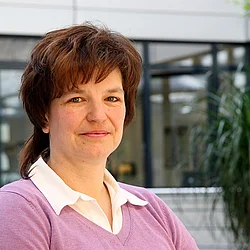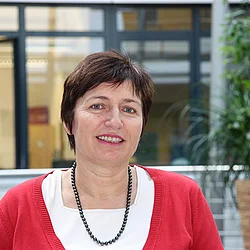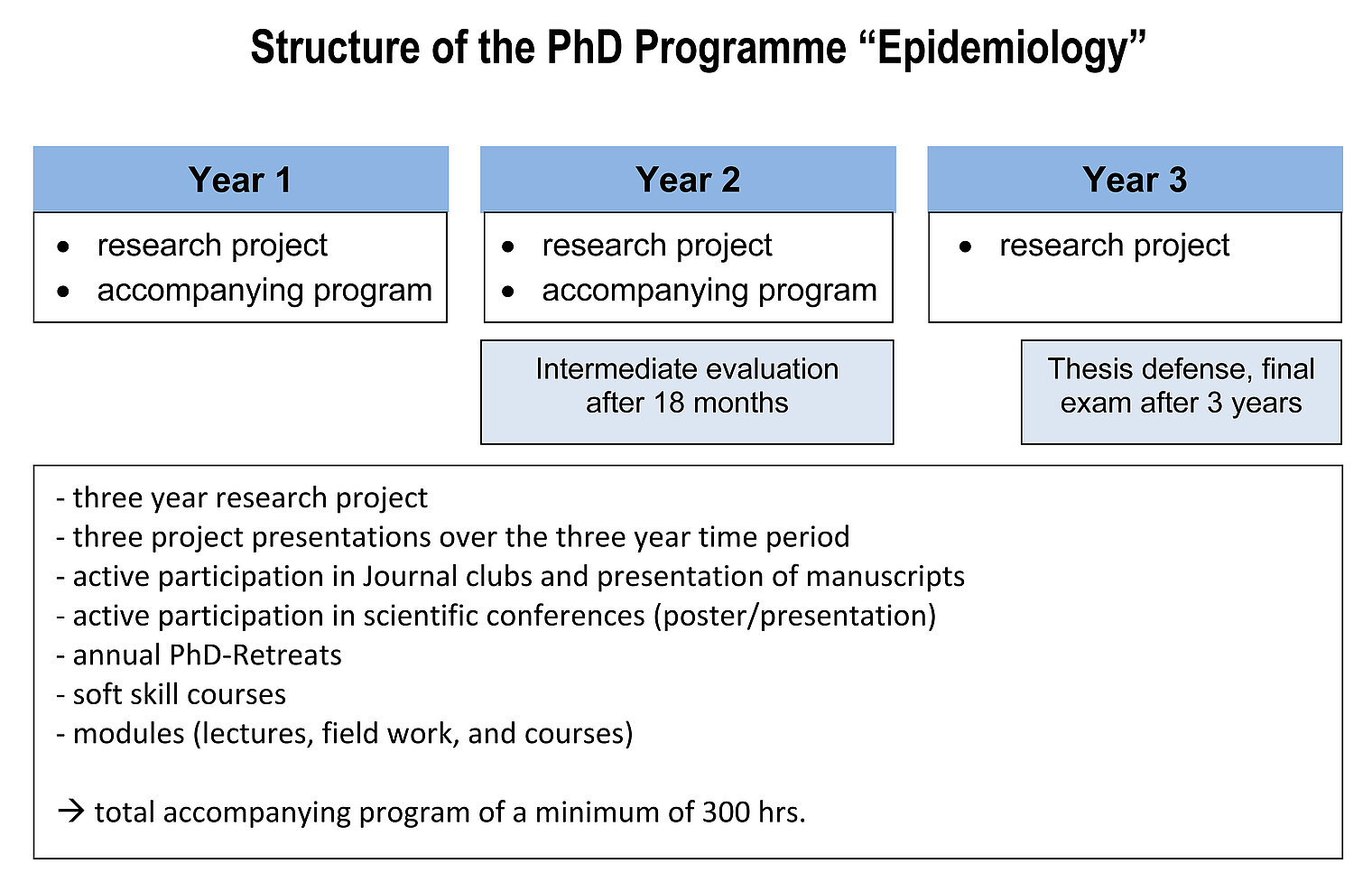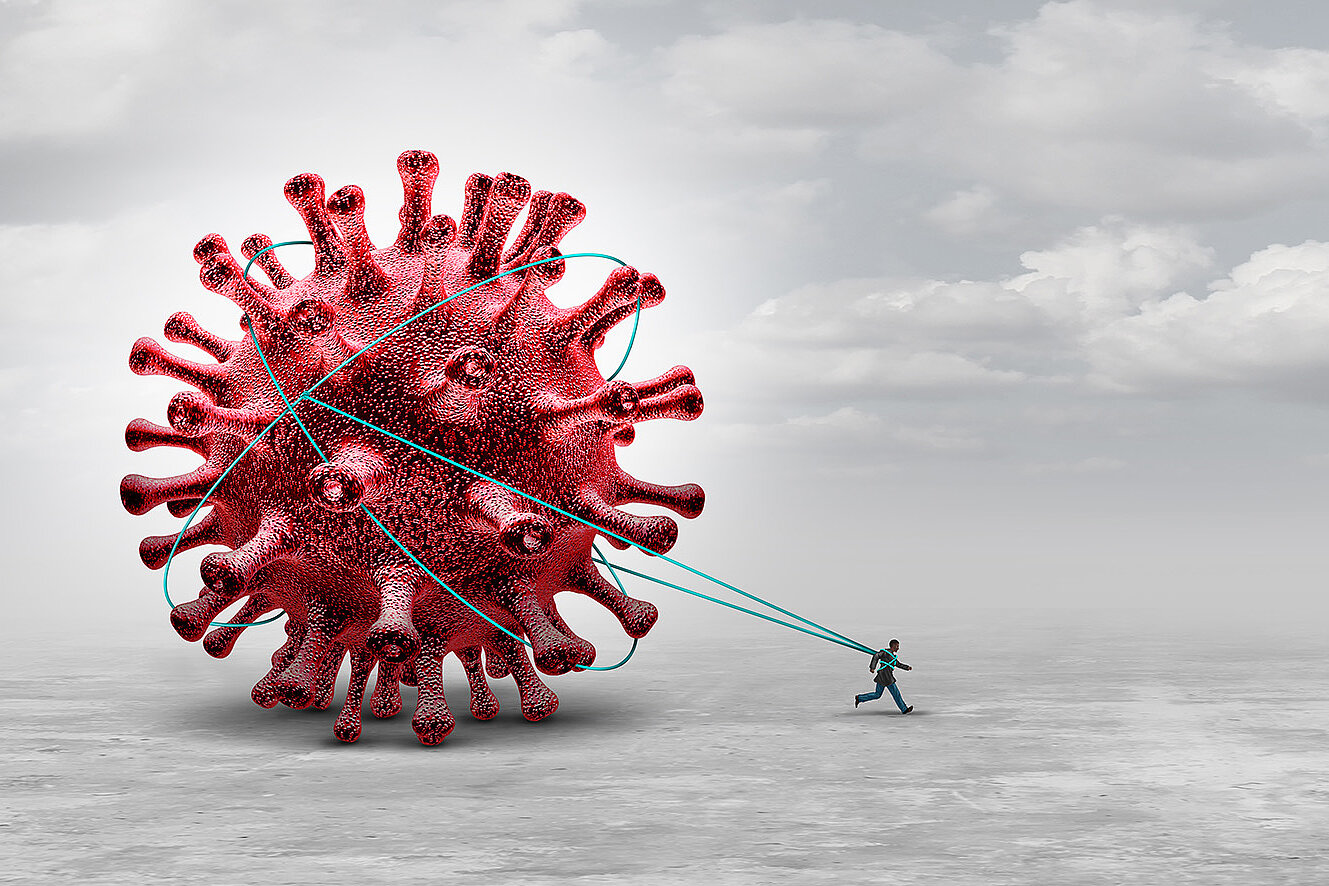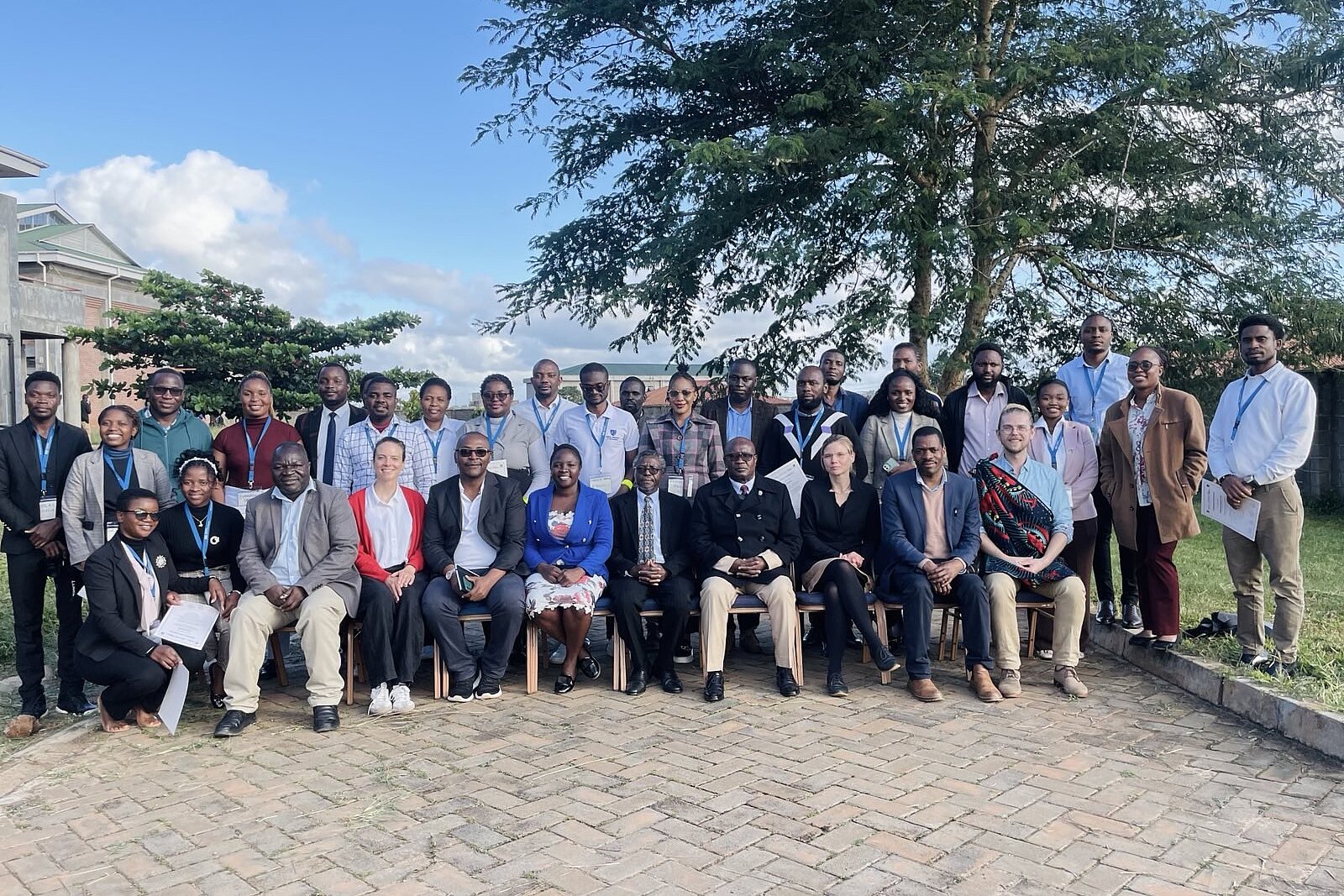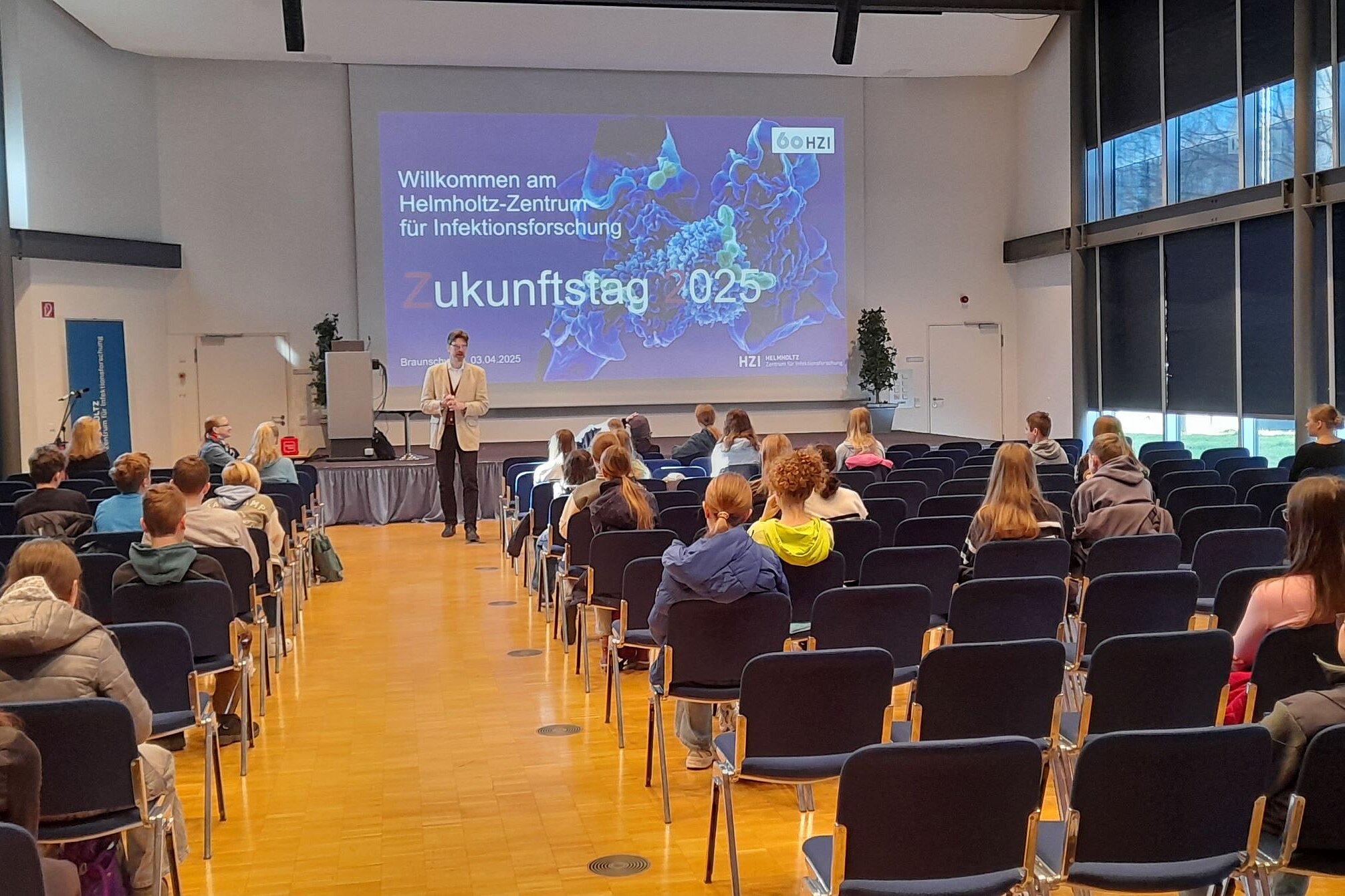Author count: 9
Slesinski S.C., Bolte G., Zhuang S., [...], Heise J.K., Keil T., Klett-Tammen C.J., ... , [...], Wolf K.
(2026)
Transportation noise and self-rated health: Evidence from the German National Cohort (NAKO)
Environ.Res.,
294
(March 2026)
Author count: 8
Lange B., Brehm T.T., Arend S.M., [...], Wagner D., Wobser R., ... , Lange C., Sester M.
(2026)
Tuberculosis incidence in solid organ transplant recipients in Europe: A multicenter TBnet cohort study
J.Infect.,
92
(1)
Author count: 7
Völker M.P., Callies C.M., Frank J., [...], Klett-Tammen C.J., ... , [...], Streit F.
(2025)
From cigarettes to symptoms: the association between smoking and depression in the German National Cohort (NAKO)
BMC Public Health
Author count: 15
Chaturvedi M., Bartz A., Denkinger C.M., Klett-Tammen C., Kretzschmar M., Kuhlmann A., Lange B., Marx F.M., Mikolajczyk R., Monsef I., Nguyen H.T., Suer J., Skoetz N., ... , Jaeger V.K., Karch A.
(2025)
Guidelines on reporting and assessing dynamic mathematical models of infectious diseases: a scoping review
BMC Infect.Dis.
Author count: 9
Hirai A., Silenou B., Bukasa T., Barka B.M., Mwakisenda F., Dörrbecker J., Dixon T., ... , Aaron A., Altmann M.
(2025)
Evaluating the performance of digital surveillance for epidemic-prone diseases in Kwango Province, Democratic Republic of Congo
Front.Public Health,
13
Author count: 9
Sester M., Altet-Gomez N., Andersen A.B., [...], Lange B., [...], Wagner D., ... , [...], Lange C.
(2025)
Correction to Diagnostic accuracy and predictive value of the QuantiFERON-TB gold plus assay for tuberculosis in immunocompromised individuals: a prospective TBnet study Lancet Reg Health Eur 57 (2025) 101416 LLRHEUROPE-D-25-00310 (The Lancet Regional Health - Europe (2025) 57, (S266677622500208X), (10.1016/j.lanepe.2025.101416))
Lancet.Reg.Health.Eur.,
59
(December 2025)
Author count: 20
Moreira-Sousa D., Martins B., Aguiar A., Pinheiro M., Akkerman O., Aksamit T.R., Aliberti S., Andrejak C., Daley C.L., van Ingen J., Lange C., Lipman M., Loebinger M.R., Jankovic Makek M., Morimoto K., Thomson R.M., Wagner D., Winthrop K.L., ... , Yim J.J., Duarte R.
(2025)
Consensus on Management of Refractory Nontuberculous Mycobacterial Pulmonary Disease
Eur.Respir.J
Author count: 48
Maskarinec G., Klapp R., Nöthlings U., Schulze M.B., Bamberg F., MacHann J., Schlesinger S., Leitzmann M., Sedlmeier A., Bohmann P., Rospleszcz S., Nattenmüller J., Haueise T., Steindorf K., Niendorf T., Schlett C.L., Greiser K.H., Panreck L., Linseisen J., Conzen C.A., Gastell S., Schikowski T., Völzke H., Bülow R., Peters A., Niedermayer F., Kaaks R., Becher H., Karch A., Berger K., Keil T., Krist L., Hoffmeister M., Mons U., Schmidt B., Stang A., Mikolajczyk R., Kluttig A., Lieb W., Ã-vermöhle C., Hebestreit A., Günther K., Harth V., Obi N., Castell S., Kettlitz R., ... , Nimptsch K., Pischon T.
(2025)
Association of a Lifestyle Risk Index With Visceral and Subcutaneous Adipose Tissue in the German National Cohort (NAKO)
Obesity
Author count: 18
Görig T., Baurecht H., Günther K., Harries M., Harth V., Keil T., Krist L., Kristiansen N.O., Leitzmann M., Meyerdierks D., Mikolajczyk R., Moreno I., Obi N., Pendt P., Pischon T., Schmidt B., ... , Zeeb H., Diehl K.
(2025)
Socio-economic status and tanning bed use: Results from the German National Cohort (NAKO)
Journal of the European Academy of Dermatology and Venereology,
40
Author count: 9
Müller L., Mallick P., Marin-Carballo A.B., Dönges P., Kettlitz R., Klett-Tammen C.J., Kretzschmar M., ... , Priesemann V., Contreras S.
(2025)
Testing paradox may explain increased observed prevalence of bacterial STIs among MSM on HIV PrEP: A modeling study
Proc.Natl.Acad.Sci.U.S.A.,
122
(44)
Author count: 11
Kettlitz R., Harries M., Contreras S., Reinecke J., Wieder M.S., Von Lengerke T., Castell S., Lange B., Klett-Tammen C.J., ... , PCR-4-ALL study group, MuSPAD Study Group
(2025)
Self-reported poliomyelitis vaccination and documentation in adults indicates high uptake: a digital German epidemic panel, December 2024
BMC Public Health,
25
(1)
Author count: 26
Klinger-König J., Streit F., Völker M.P., Frank J., Sekula P., Jaskulski S., Leitzmann M., Meinke-Franze C., Schmidt C.O., Keil T., Willich S.N., Pischon T., Moreno I.M., Frost J., Schmidt B., Heise J.K., Klett-Tammen C.J., Koch-Gallenkamp L., Obi N., Harth V., Mons U., Berger K., Greiser K.H., Mikolajczyk R., ... , Schulze M.B., Grabe H.J.
(2025)
Childhood maltreatment and adult diseases in the general population: the mediating role of smoking and overweight in a time-sequence design
BMC Public Health,
25
(1)
Author count: 18
Al-Herwi E., Al-Kainai H., Alshoaibi M., Thabet H., Farhan M.A., Morshed E., Alherwi M., Alkhyat E., Saleh R.M., Alhasani A., Quddam A., Abbas A.B., Ba-Alawi T., Al-Afif S., Bruns T., Lange B., ... , Hovardovska O., Begali H.
(2025)
Outbreak of multi-drug resistant Vibrio cholerae Ogawa Serotype in Ibb, Yemen (2018-2024): The OVCO-IY study
Int.J.Infect.Dis.,
161
(December 2025)
Author count: 2
Hassenstein M.J., Vanella P.
(2022)
Data Quality - Concepts and Problems
Encyclopedia,
2
(1)
Author count: 9
Walther G., Brand T., Dragano N., ..., Hovardovska O., ..., Lange B., ... , ..., Winkler V.
(2025)
Migration and cardiovascular disease: A comparative study of prevalence and risk factor profiles in resettlers from the German National Cohort (NAKO)
Ann.Epidemiol.,
111
(November 2025)
Author count: 9
Walther G., Brand T., Dragano N., ..., Hovardovska O., ..., Lange B., ... , ..., Winkler V.
(2025)
Corrigendum to "Migration and cardiovascular disease: A comparative study of prevalence and risk factor profiles in resettlers from the German National Cohort (NAKO)" [Ann Epidemiol 111 (2025) 14-23, (S1047279725002637), (10.1016/j.annepidem.2025.09.008)]
Ann.Epidemiol.,
111
(November 2025)
Author count: 5
Fome A.D., Rodiah I., Bock W., Lange B., Klar A.
(2025)
The interplay of influenza and COVID-19 in Germany, January 2020 - December 2022: a study of competitive disease dynamics with quarantine measures and partial cross-immunity
BMC Public Health,
25
(1)
Author count: 7
Martinez L., Campbell J.I., Linde L., ..., Hauri A.M., ... , ..., Seddon J.A.
(2025)
The Effectiveness of Isoniazid Preventive Treatment among Contacts of Multidrug-Resistant Tuberculosis: A Systematic Review and Individual-Participant Meta-Analysis
Am.J.Respir.Crit Care Med.
Author count: 7
Sester M., Altet-Gomez N., Andersen A., ..., Wagner D., ... , ..., Lange C.
(2025)
Diagnostic accuracy and predictive value of the QuantiFERON-TB gold plus assay for tuberculosis in immunocompromised individuals: a prospective TBnet study
Lancet Regional Health - Europe,
57
Author count: 5
Nyirenda J.L.Z., Mbakaya B.C., Wagner D., ..., Lange B.
(2025)
NOZGEKA - a collaborative curriculum development process for a Master of Science in Public health with a focus on infectious diseases epidemiology in Malawi: a perspective
Human Soc Sci Comm,
12
(1)
Author count: 32
Rothoeft T., Hoffmann A.T., Maier C., Denz R., Kobbe R., Friedrichs A., Behrens G.M.N., Behrens P., Berner R., Caliebe A., Denkinger C.M., Giesbrecht K., Hojenski L., Hovardovska O., Dopfer-Jablonka A., Iatseniuk O., Kaasch A.J., Kraus M., Mitrov L., Nauck M., de Miranda S.N., Scherer M., Schmiedel Y., Stahl D., Timmesfeld N., Toepfner N., Vehreschild J., Wohlgemuth W.A., Petersmann A., Vehreschild M.J.G.T., ... , Brinkmann F., NU(M)KRAINE Study Group
(2025)
Performance of whole blood interferon-y release assays in SARS-CoV-2 and tuberculosis is age dependent
Infection
Author count: 7
Kluttig A., Zschocke J., ..., Gastell S., Kemmling Y., ... , ..., Brandes M..
(2025)
Erratum zu: Messung der körperlichen Fitness in der NAKO Gesundheitsstudie - Methoden, Qualitätssicherung und erste deskriptive Ergebnisse (Bundesgesundheitsblatt - Gesundheitsforschung - Gesundheitsschutz, (2020), 63, 3, (312-321), 10.1007/s00103-020-03100-3)
Bundesgesund.blatt.Gesund.forschung.Gesund.schutz.,
68
(9)
Author count: 27
Thews O., Schmid T., Kluttig A., Wienke A., Zinkhan M., Ahrens W., Bärnighausen T., Brenner H., Castell S., Lange B., Lieb W., Greiser K.H., Dörr M., Krist L., Willich S.N., Harth V., Obi N., Leitzmann M., Peters A., Schmidt B., Schulze M.B., Völzke H., Nauck M., Zylla S., Hannemann A., ... , Pischon T., Velasquez I.M.
(2025)
Physiological serum uric acid concentrations correlate with arterial stiffness in a sex-dependent manner
BMC Med.,
23
(1)
Author count: 5
Kettlitz R., Ortmann J., Kerrinnes T., Ott J.J., Castell S.
(2025)
Feasibility of blood self-sampling with HemaSpot HF for Anti-Clostridium tetani Toxin IgG detection
Sci.Rep.,
15
(1)
Author count: 10
Böff L., Bartz A., Harries M., MuSPAD Consortium Group, COVIMOD Consortium Group, RESPINOW Consortium Group, Karch A., Aigner A., ... , Jaeger V.K., Lange B.
(2025)
Dynamics of contact behaviour by self-reported COVID-19 vaccination and infection status during the COVID-19 pandemic in Germany: an analysis of two large population-based studies
BMC Med.,
23
(1)
Author count: 10
Diexer S., Frost J., Ahnert P., Baernighausen T.W., Brenner H., Fricke J., Gabrysch S., Greiser K.H., ... , Harth V., Heise J.K.
(2025)
Cross-sectional study of health impairment related to post COVID-19 condition among participants of a large population-based cohort in Germany
Sci.Rep.,
15
(1)
Author count: 14
Morales I., Nguyen V.K., bd El Aziz M., Sultani A., Bärnighausen T., Becher H., Ciesek S., Kampmann B., Lange B., Rupp J., Scheithauer S., Ward H., ... , Karch A., Denkinger C.M.
(2025)
Responsive population-based cohorts as platforms for characterising pathogen- and population-level infection dynamics for epidemic prevention, preparedness and response
Euro Surveill,
30
(25)
Author count: 39
Jaehn P., Rach S., Bolte G., Mikolajczyk R., Merz S., Herrera-Espejel P.S., Brand T., Führer A., Berger K., Teismann H., Bohn B., Koch-Gallenkamp L., Brenner H., Klett-Tammen C.J., Castell S., Ebert N., Emmel C., Schmidt B., Gastell S., Schulze M.B., Obi N., Harth V., Holleczek B., Jaskulski S., Katzke V., Kaaks R., Willich S.N., Keil T., Weber A., Leitzmann M., Wirkner K., Meinke-Franze C., Schipf S., Schikowski T., Schneider A., Slesinski S.C., Moreno-Velasquez I., ... , Pischon T., Holmberg C.
(2025)
What can we learn from an intersectionality-informed description of study participants? Results from the German National Cohort
International Journal for Equity in Health,
24
(1)
Author count: 32
Peters A., Knauthe N., Hamann S., Leendertz F.H., Lange B., Guzman C.A., Grün B., Jewell S., Breteler M.M.B., Aziz N.A., Schiattarella G.G., Lee Y.A., Landthaler M., Gorski S.A., Steindorf K., Hoffmeister M., Braun A., Ziegler A.G., Mutius E., Krüger J., Mons U., Zeggini E., Helmholtz Health Prevention Task Force, German National Cohort (NAKO), Helmholtz-Zentrum Dresden-Rossendorf (HZDR), Helmholtz Centre for Infection Research (HZI), Helmholtz-Zentrum Dresden-Rossendorf (HZDR), German Center for Neurodegenerative Diseases (DZNE), Max Delbruck Center for Molecular Medicine (MDC), German Cancer Research Center (DKFZ), ... , Helmholtz Center Munich (Helmholtz Munich), Helmholtz Health Prevention Task Force Chairs
(2025)
Helmholtz Health task force to strengthen prevention research and its translation globally
Nature medicine,
31
(5)
Author count: 42
Rach S., Sand M., Reineke A., Becher H., Greiser K.H., Wolf K., Wirkner K., Schmidt C.O., Schipf S., Jöckel K.H., Krist L., Ahrens W., Brenner H., Castell S., Gastell S., Harth V., Holleczek B., Ittermann T., Janisch-Fabian S., Karch A., Keil T., Klett-Tammen C.J., Kluttig A., Kuß O., Leitzmann M., Lieb W., Meinke-Franze C., Michels K.B., Mikolajczyk R., Moreno Velasquez I., Obi N., Övermöhle C., Peters A., Pischon T., Rospleszcz S., Schmidt B., Schulze M.B., Stang A., Teismann H., Töpfer C., ... , Wolff R., Günther K.
(2025)
The baseline examinations of the German National Cohort (NAKO): recruitment protocol, response, and weighting
Eur.J.Epidemiol.
Author count: 8
Batista M.L., Carvalho B., Gibb R., Solaraju-Murali B., Flasche S., Castell S., ... , Ghozzi S., Lowe R.
(2025)
Modelling the impact of climate and the environment on the spatiotemporal dynamics of Lyme borreliosis in Germany
EBioMedicine,
115
Author count: 13
Hasselbring W., Druskat S., Bernoth J., Betker P., Felderer M., Ferenz S., Hermann B., Lamprecht A.L., Linxweiler J., Prat A., Rumpe B., ... , Schoening-Stierand K., Yang S.
(2025)
Multi-Dimensional Research Software Categorization
Computing in Science and Engineering
Author count: 13
Phuong H.T., Bartz A., Jarynowski A.K., Lange B., Jarvis C.I., Rübsamen N., Mikolajczyk R.T., Scholz S., Berger T., Heinsohn T., Belik V., ... , Karch A., Jaeger V.K.
(2025)
Changes in social contact patterns in Germany during the SARS-CoV-2 pandemic - an analysis based on the COVIMOD study
BMC Infectious Diseases,
25
(1)
Author count: 5
Simon S., Kaiser M.S., Bachmann M., Krause G., Gottlieb J.
(2025)
Point-of-Care Testing by Multiplex-PCR in Different Compartments in Suspected Lower Respiratory Tract Infection After Lung Transplantation - Results of a Prospective Study
Transplant Infectious Disease
Author count: 26
Vonneilich N., Becher H., Berger K., Bohmann P., Brenner H., Castell S., Dragano N., Harth V., Jaskulski S., Karch A., Keil T., Krist L., Lange B., Leitzmann M., Massag J., Meinke-Franze C., Mikolajczyk R., Obi N., Pischon T., Reuter M., Schmidt B., Velasquez I.M., Völzke H., Wiessner C., ... , dem Knesebeck O., Lüdecke D.
(2025)
Depressive symptoms, education, gender and history of migration - an intersectional analysis using data from the German National Cohort (NAKO)
International Journal for Equity in Health,
24
(1)
Author count: 32
Fay L., Hepp T., Winkelmann M.T., Peters A., Heier M., Niendorf T., Pischon T., Endemann B., Schulz-Menger J., Krist L., Schulze M.B., Mikolajczyk R., Wienke A., Obi N., Silenou B.C., Lange B., Kauczor H.U., Lieb W., Baurecht H., Leitzmann M., Trares K., Brenner H., Michels K.B., Jaskulski S., Völzke H., Nikolaou K., Schlett C.L., Bamberg F., Lescan M., Yang B., ... , Küstner T., Gatidis S.
(2025)
Determinants of ascending aortic morphology: Cross-sectional deep learning-based analysis on 25,073 non-contrast-enhanced NAKO MRI studies
Eur.Heart J.Cardiovasc.Imaging
Author count: 14
Lange C., Bothamley G., Günther G., Guglielmetti L., Kontsevaya I., Kuksa L., Lange B., Lorent N., Saluzzo F., Sester M., Tebruegge M., Tunesi S., ... , Tweed C., Tuberculosis Network European Trials group (TBnet)
(2025)
A Year in Review on Tuberculosis and Non-tuberculous Mycobacteria Disease: A 2025 Update for Clinicians and Scientists
Pathog.Immunity,
10
(2)
Author count: 40
Moreno Velasquez I, Peters S.A.E., Dragano N., Greiser K.H., Dörr M., Fischer B., Berger K., Hannemann A., Schnabel R.B., Nauck M., Göttlicher S., Rospleszcz S., Willich S.N., Krist L., Schulze M.B., Günther K., Brand T., Schikowski T., Emmel C., Schmidt B., Michels K.B., Mikolajczyk R., Kluttig A., Harth V., Obi N., Castell S., Klett-Tammen C.J., Lieb W., Becher H., Winkler V., Minnerup H., Karch A., Meinke-Franze C., Leitzmann M., Stein M.J., Bohn B., Schöttker B., Trares K., ... , Peters A., Pischon T.
(2025)
Sex Differences in the Relationship of Socioeconomic Position With Cardiovascular Disease, Cardiovascular Risk Factors, and Estimated Cardiovascular Disease Risk: Results of the German National Cohort
J.Am.Heart Assoc.,
14
(5)
Author count: 6
Finch E., Batista M.L., Alcayna T., Lee S.A., Fletcher I.K., Lowe R.
(2024)
Early warning systems for vector-borne diseases: engagement, methods and implementation
Ecology and Control of Vector-Borne Diseases
(14)
Author count: 12
Kwabla M.P., Amuasi J.H., Krause G., Dormechele W., Takramah W., Kye-Duodu G., Osei E., der J., Baiden F., dusi-Poku Y., ... , Binka F.N., Castell S.
(2025)
Completeness of tuberculosis case notification in Ghana: record linkage and capture-recapture analysis of three TB registries
BMC Infectious Diseases,
25
(1)
Author count: 34
Stein M.J., Weber A., Bamberg F., Baurecht H., Berger K., Bohmann P., Brenner H., Brummer J., Dörr M., Fischer B., Gastell S., Greiser K.H., Harth V., Hebestreit A., Heise J.K., Herbolsheimer F., Ittermann T., Karch A., Keil T., Kluttig A., Krist L., Michels K.B., Mikolajczyk R., Nauck M., Nimptsch K., Obi N., Pischon T., Pivovarova-Ramich O., Schikowski T., Schmidt B., Schulze M.B., Steindorf K., ... , Zylla S., Leitzmann M.F.
(2025)
Diurnal timing of physical activity in relation to obesity and diabetes in the German National Cohort (NAKO)
Int.J Obes.(Lond)
Author count: 28
Klee B., Diexer S., Langer S., Gottschick C., Hartmann C., Glaser N., Horn J., Dorendorf E., Raupach-Rosin H., Hassan L., Rübsamen N., Meyer-Schlinkmann K.M., Guzman C.A., Heselich V., Battin E., Pietschmann T., Pieper D.H., Pletz M., Riese P., Trittel S., Thies S., von Kaisenberg C., Dressler F., Guthmann F., Oberhoff C., Schild R.L., ... , Karch A., Mikolajczyk R.
(2025)
Acute respiratory tract infections during the first six years of life - results from the German birth cohort study LoewenKIDS
Int.J Infect.Dis.,
153
(April 2025)
Author count: 6
Kettlitz R., Buchmann M., Tuncer O., Krause L., Ziese T., Reitzle L.
(2024)
Surveillance of non-communicable diseases: What matters to users? A qualitative interview study
J Health Monit.,
9
(4)
Author count: 41
Samietz S., Borof K., Hertrampf K., Aarabi G., Ciardo A., Finke H., Hagenfeld D., Kühnisch J., Rütters M., Baumeister S.E., Reckelkamm S.L., Kim T.S., Kocher T., Ahrens W., Brenner H., Emmel C., Fischer B., Führer A., Greiser K.H., Grischke J., Günther K., Harth V., Jaskulski S., Karch A., Keil T., Kemmling Y., Kluttig A., Krist L., Kuss O., Leitzmann M., Meinke-Franze C., Michels K.B., Obi N., Peters A., Pischon N., Pischon T., Schipf S., Schmidt B., Teismann H., ... , Rupf S., Holtfreter B.
(2025)
Dental and oral health assessments in the German National Cohort (NAKO)
BMC.Oral Health,
25
(1)
Author count: 22
Kunst H., Lange B., Hovardovska O., Bockey A., Zenner D., Andersen A.B., Hargreaves S., Pareek M., Friedland J.S., Wejse C., Bothamley G., Guglielmetti L., Chesov D., Tiberi S., Matteelli A., Mandalakas A.M., Heyckendorf J., Eimer J., Malhotra A., Zamora J., ... , Vasiliu A., Lange C.
(2024)
Tuberculosis in adult migrants in Europe: a TBnet consensus statement
Eur.Respir.J.
Author count: 10
Littlecott H., Krishnaratne S., Hummel J., Orban E., Heinsohn T., Noel-Storr A.H., Strahwald B., Jung-Sievers C., ... , Ravens-Sieberer U., Rehfuess E.
(2024)
Unintended consequences of measures implemented in the school setting to contain the COVID-19 pandemic: a scoping review
Cochrane Database Syst.Rev.,
2024
(12)
Author count: 16
Schulze-Wundling K., Ottensmeyer P.F., Meyer-Schlinkmann K.M., Deckena M., Krüger S., Schlinkert S., Budde A., Münstermann D., Töpfner N., Petersmann A., Nauck M., Karch A., Lange B., Blaschke S., ... , Tiemann C., Streeck H.
(2023)
Immunity Against SARS-CoV-2 in the German Population
Dtsch.Arztebl.Inter.,
120
(19)
Author count: 13
Lehky M., Moonian T., Michel T., Junker D., Müsken M., Strömpl J., Nübling P., Neumann F., Krumbholz A., Krause G., Schneiderhan-Marra N., ... , van den Heuvel J., Strengert M.
(2025)
A novel method for recombinant mammalian-expressed S-HBsAg virus-like particle production for assembly status analysis and improved anti-HBs serology
Protein Sci.,
34
(1)
Author count: 37
Rodriguez F.S., Röhr S., Dragano N., Schmidt B., Becher H., Schikowski T., Gastell S., Harth V., Hoven H., Linseisen J., Greiser K.H., Leitzmann M., Bohmann P., Castell S., Heise J.K., Krist L., Keil T., Karch A., Teismann H., Moreno Vel+ísquez I., Pischon T., Peters A., F++hrer A., Mikolajczyk R., G++nther K., Brand T., Meinke-Franze C., Schipf S., Grabe H.J., Brenner H., Koch-Gallenkamp L., Berger K., Wagner M., Katzke V., Lieb W., ... , Pabst A., Riedel-Heller S.G.
(2024)
Low income, being without employment, and living alone: how they are associated with cognitive functioning
Aging Neuropsychol.Cogn.
Author count: 32
Hoffmann A.T., Kobbe R., Denz R., Maier C., Toepfner N., Timmesfeld N., Petersmann A., Giesbrecht K., Hovardovska O., Vehreschild J.J., Scherer M., de Miranda S.M.N., Mitrov L., Friedrichs A., Caliebe A., Skipiol K.E., Holzwarth S., Kaur Y., Schlegtendal A., Hojenski L., Sergeev D., Hamprecht A., Brandhorst G., H+Âppner J., L++cke T., Denkinger C.M., Almahfoud M., Liashenko I., Wauschkuhn C., Dopfer-Jablonka A., ... , Akinina A., Vehreschild M.J.G.T.
(2025)
Health and socio-demographic background of Ukrainian minors and their families in Germany - challenges for refugee medicine: A cross-sectional study from the German Network University Medicine (NUM)
Eur.J.Pediatr.,
184
(1)
Author count: 9
Schauer S., Egger M., Kesselbacher-Pirker M., Rodiah I., Horvadovska O., Lange B., Fauster N.F.R.M., ... , Zenz H., Kimmich C.
(2024)
How CIs can Tackle Future Pandemics A Multi-Domain Approach to Improve CI Resilience
(Main Track Invited Contributions, Nr. 6)
Author count: 20
Roesner L.M., Gupta M.K., Kopfnagel V., van Unen N., Kemmling Y., Heise J., Castell S., Jiang X., Riemann L., Traidl S., Lange B., Sühs K., Illig T., Strowig T., Li Y., Förster R., Huehn J., Schulz T.F., ... , Werfel T., RESIST SI Cohort Investigators
(2024)
Correction to: The RESIST Senior Individuals Cohort: Design, participant characteristics and aims (GeroScience, (2024), 10.1007/s11357-024-01299-6)
GeroScience
Author count: 34
Stein J., Pabst A., Berger K., Karch A., Teismann H., Streit F., Grabe H.J., Mikolajczyk R., Massag J., Lieb W., Castell S., Heise J.K., Schulze M.B., Gastell S., Harth V., Obi N., Peters A., Huemer M.T., Bohmann P., Leitzmann M., Schipf S., Meinke-Franze C., Hebestreit A., Fuhr D.C., Michels K.B., Jaskulski S., Stocker H., Koch-Gallenkamp L., Willich S.N., Keil T., Löffler M., Wirkner K., ... , Riedel-Heller S.G., German National Cohort (NAKO) Consortium
(2024)
Mental health of individuals with pre-existing mental illnesses at the beginning of the COVID-19 pandemic: results of the German National Cohort (NAKO)
Front.Public Health,
12
Author count: 21
Berger K., Baurecht H., Stein M., Heise J.K., Castell S., Weisser L., Schikowski T., Oliver K., Lieb W., Micolajczyk R., Kluttig A., Schmitt B., Stang A., Pischon T., Peters A., Brenner H., Leitzmann M., Krist L., Keil T., ... , Karch A., Meyer T.
(2024)
SoccHealth: a health status examination of former professional football (soccer) players within the German National Cohort
BMJ Open Sport Exerc.Med.,
10
(4)
Author count: 20
Roesner L.M., Gupta M.K., Kopfnagel V., van Unen N., Kemmling Y., Heise J.K., Castell S., Jiang X., Riemann L., Traidl S., Lange B., Sühs K.W., Illig T., Strowig T., Li Y., Förster R., Huehn J., Schulz T.F., ... , Werfel T., RESIST SI Cohort Investigators
(2024)
The RESIST Senior Individuals Cohort: Design, participant characteristics and aims
GeroScience
Author count: 7
Chaturvedi M., Rodiah I., Kretzschmar M., Scholz S., Lange B., ... , Karch A., Jaeger V.K.
(2024)
Estimating the relative importance of epidemiological and behavioural parameters for epidemic mpox transmission: a modelling study
BMC Medicine,
22
(1)
Author count: 11
Kaburi B.B., Harries M., Hauri A.M., Kenu E., Wyss K., Silenou B.C., Klett-Tammen C.J., Ressing C., Awolin J., ... , Lange B., Krause G.
(2024)
Availability of published evidence on coverage, cost components, and funding support for digitalisation of infectious disease surveillance in Africa, 2003-2022: a systematic review
BMC.Public Health,
24
(1)
Author count: 38
Mikolajczyk R., Diexer S., Klee B., Pfrommer L., Purschke O., Fricke J., Ahnert P., Gabrysch S., Gottschick C., Bohn B., Brenner H., Buck C., Castell S., Gastell S., Greiser K.H., Harth V., Heise J.K., Holleczek B., Kaaks R., Keil T., Krist L., Leitzmann M., Lieb W., Meinke-Franze C., Michels K.B., Velasquez I.M., Obi N., Panreck L., Peters A., Pischon T., Schikowski T., Schmidt B., Standl M., Stang A., Völzke H., Weber A., ... , Zeeb H., Karch A.
(2024)
Likelihood of Post-COVID Condition in people with hybrid immunity; data from the German National Cohort (NAKO)
J.Infect.,
89
(2)
Author count: 29
Stein M.J., Fischer B., Bohmann P., Ahrens W., Berger K., Brenner H., Günther K., Harth V., Heise J.K., Karch A., Klett-Tammen C.J., Koch-Gallenkamp L., Krist L., Lieb W., Meinke-Franze C., Michels K.B., Mikolajczyk R., Nimptsch K., Obi N., Peters A., Pischon T., Schipf S., Schmidt B., Stang A., Thierry S., Willich S.N., Wirkner K., ... , Leitzmann M.F., Sedlmeier A.M.
(2024)
Differences in Anthropometric Measures Based on Sex, Age, and Health Status
Dtsch.Arztebl.Int.,
121
(7)
Author count: 13
Hernandez-Mejia G., Scheithauer S., Blaschke S., Kucheryava N., Schwarz K., Moellmann J., Tomori D.V., Bartz A., Jaeger V.K., Lange B., Kuhlmann A., ... , Holzhausen J., Karch A.
(2024)
Architectural interventions to mitigate the spread of SARS-CoV-2 in emergency departments
J.Hosp.Infect.
Author count: 9
Bockey A.J., Braun C., Camp J., Janda A., Kern W.V., Müller A.M., Stete K., ... , Rieg S.R., Lange B.
(2024)
Health care utilisation of asylum seekers and refugees in the South-West of Germany
PLoS ONE,
19
(4 April)
Author count: 34
Holz A., Obi N., Ahrens W., Berger K., Bohn B., Brenner H., Fischer B., Fricke J., F++hrer A., Gastell S., Greiser K.H., Harth V., Heise J.K., Holleczek B., Keil T., Klett-Tammen C.J., Leitzmann M., Lieb W., Meinke-Franze C., Michels K.B., Mikolajczyk R., Nimptsch K., Peters A., Pischon T., Riedel O., Schikowski T., Schipf S., Schmidt B., Schulze M.B., Stang A., Hellwig K., Riemann-Lorenz K., ... , Heesen C., Becher H.
(2024)
Childhood and adolescence factors and multiple sclerosis: results from the German National Cohort (NAKO)
BMC Neurology,
24
(1)
Author count: 45
Weber A., van Hees V.T., Stein M.J., Gastell S., Steindorf K., Herbolsheimer F., Ostrzinski S., Pischon T., Brandes M., Krist L., Marschollek M., Greiser K.H., Nimptsch K., Brandes B., Jochem C., Sedlmeier A.M., Berger K., Brenner H., Buck C., Castell S., Dörr M., Emmel C., Fischer B., Flexeder C., Harth V., Hebestreit A., Heise J.K., Holleczek B., Keil T., Koch-Gallenkamp L., Lieb W., Meinke-Franze C., Michels K.B., Mikolajczyk R., Kluttig A., Obi N., Peters A., Schmidt B., Schipf S., Schulze M.B., Teismann H., Waniek S., Willich S.N., ... , Leitzmann M.F., Baurecht H.
(2024)
Large-scale assessment of physical activity in a population using high-resolution hip-worn accelerometry: the German National Cohort (NAKO)
Scientific Reports,
14
(1)
Author count: 42
Streit F., Völker M.P., Klinger-König J., Zillich L., Frank J., Reinhard I., Foo J.C., Witt S.H., Sirignano L., Becher H., Obi N., Riedel O., Do S., Castell S., Hassenstein M.J., Karch A., Stang A., Schmidt B., Schikowski T., Stahl-Pehe A., Brenner H., Perna L., Greiser K.H., Kaaks R., Michels K.B., Franzke C.W., Peters A., Fischer B., Konzok J., Mikolajczyk R., Führer A., Keil T., Fricke J., Willich S.N., Pischon T., Völzke H., Meinke-Franze C., Loeffler M., Wirkner K., Berger K., ... , Grabe H.J., Rietschel M.
(2023)
The interplay of family history of depression and early trauma: associations with lifetime and current depression in the German national cohort (NAKO)
Front Epidemiol.,
3
Author count: 6
Pape S., Karki S.J., Heinsohn T., Brandes I., Dierks M.L., Lange B.
(2024)
Tuberculosis case fatality is higher in male than female patients in Europe: a systematic review and meta-analysis
Infection
Author count: 27
Wiessner C., Licaj S., Klein J., Bohn B., Brand T., Castell S., F++hrer A., Harth V., Heier M., Heise J.K., Holleczek B., Jaskulski S., Jochem C., Koch-Gallenkamp L., Krist L., Leitzmann M., Lieb W., Meinke-Franze C., Mikolajczyk R., Moreno Vel+ísquez I., Obi N., Pischon T., Schipf S., Thierry S., Willich S.N., ... , Zeeb H., Becher H.
(2024)
Health Service Use Among Migrants in the German National Cohort
Int.J.Public Health,
69
Author count: 27
Hajek A., Becher H., Brenner H., Holleczek B., Katzke V., Kaaks R., Minnerup H., Karch A., Baurecht H., Leitzmann M., Peters A., Gastell S., Ahrens W., Haug U., Nimptsch K., Pischon T., Michels K.B., Dorrn A., Klett-Tammen C.J., Castell S., Willich S.N., Keil T., Schipf S., Meinke-Franze C., Harth V., ... , Obi N., König H.H.
(2024)
Personality and the use of cancer screenings - Results of the German National Cohort
Preventive Med.Reports,
41
(May 2024)
Author count: 14
Rothoeft T., Maier C., Talarico A., Hoffmann A., Schlegtendal A., Lange B., Petersmann A., Denz R., Timmesfeld N., Toepfner N., Vidal-Blanco E., Pfaender S., ... , Lücke T., Brinkmann F.
(2024)
Natural and hybrid immunity after SARS-CoV-2 infection in children and adolescents
Infection
Author count: 30
Brinkmann F., Friedrichs A., Behrens G.M., Behrens P., Berner R., Caliebe A., Denkinger C.M., Giesbrecht K., Gussew A., Hoffmann A.T., Hojenski L., Hovardovska O., Dopfer-Jablonka A., Kaasch A.J., Kobbe R., Kraus M., Lindner A., Maier C., Mitrov L., Nauck M., de Miranda S.N., Scherer M., Schmiedel Y., Stahl D., Timmesfeld N., Toepfner N., Vehreschild J., Wohlgemuth W.A., ... , Petersmann A., Vehreschild M.J.G.T.
(2024)
Prevalence of infectious diseases, immunity to vaccine-preventable diseases and chronic medical conditions among Ukrainian refugees in Germany - A cross sectional study from the German Network University Medicine (NUM)
J.Infect.Public Health,
17
(4)
Author count: 32
Herbolsheimer F., Peters A., Wagner S., Willich S.N., Krist L., Pischon T., Nimptsch K., Gastell S., Brandes M., Brandes B., Schikowski T., Schmidt B., Michels K.B., Mikolajczyk R., Harth V., Obi N., Castell S., Heise J.K., Lieb W., Franzpötter K., Karch A., Teismann H., Völzke H., Meinke-Franze C., Leitzmann M., Stein M.J., Brenner H., Holleczek B., Weber A., Bohn B., ... , Kluttig A., Steindorf K.
(2024)
Changes in physical activity and sedentary behavior during the first COVID-19 pandemic- restrictions in Germany: a nationwide survey: Running head: physical activity during the COVID-19 restrictions
BMC Public Health,
24
(1)
Author count: 6
Kettlitz R., Harries M., Ortmann J., Krause G., Aigner A., Lange B.
(2024)
Publisher Correction to: Association of known SARS-CoV-2 serostatus and adherence to personal protection measures and the impact of personal protective measures on seropositivity in a population-based cross-sectional study (MuSPAD) in Germany
BMC.Public Health,
24
(1)
Author count: 14
Marsall P., Fandrich M., Griesbaum J., Harries M., Lange B., Ascough S., Dayananda P., Chiu C., Remppis J., Ganzenmueller T., Renk H., Strengert M., ... , Schneiderhan-Marra N., Dulovic A.
(2024)
Development and validation of a respiratory syncytial virus multiplex immunoassay
Infection
Author count: 2
Groß J., Möller A.
(2024)
Some additional remarks on statistical properties of Cohen's d in the presence of covariates
Statistical Papers
Author count: 22
Harries M., Jaeger V.K., Rodiah I., Hassenstein M.J., Ortmann J., Dreier M., von Holt I., Brinkmann M., Dulovic A., Gornyk D., Hovardovska O., Kuczewski C., Kurosinski M.A., Schlotz M., Schneiderhan-Marra N., Strengert M., Krause G., Sester M., Klein F., Petersmann A., ... , Karch A., Lange B.
(2024)
Bridging the gap - estimation of 2022/2023 SARS-CoV-2 healthcare burden in Germany based on multidimensional data from a rapid epidemic panel
Int.J.Infect.Dis.
Author count: 12
Hassenstein M.J., Pischon T., Karch A., Peters A., Kerrinnes T., Teismann H., Schneider A., Thierry S., Moreno Velasquez I., Janke J., ... , Kemmling Y., Castell S.
(2023)
Seropositivity of Borrelia burgdorferi s.l. in Germany-an analysis across four German National Cohort (NAKO) study sites
Sci.Rep.,
13
(1)
Author count: 7
Barth-Jaeggi T., Houngbedji C.A., Palmeirim M.S., Coulibaly D., Krouman A., ... , Ressing C., Wyss K.
(2023)
Introduction and acceptability of the Surveillance Outbreak Response Management and Analysis System (SORMAS) during the COVID-19 pandemic in Cote d'Ivoire
BMC Public Health,
23
(1)
Author count: 26
Kettlitz R., Harries M., Ortmann J., Krause G., Strengert M., Castell S., Heise J.K., Hernandez P., Gornyk D., Schl++ter M., Kerrines T., Schneiderhan-Marra N., Dulovic A., Bojara G., Frank K., Gubbe K., Tonn T., Kappert O., Kern W.V., Illig T., Klopp N., Roller G., Ziemons M., Rolle G., ... , Aigner A., Lange B.
(2023)
Association of known SARS-CoV-2 serostatus and adherence to personal protection measures and the impact of personal protective measures on seropositivity in a population-based cross-sectional study (MuSPAD) in Germany
BMC Public Health,
23
(1)
Author count: 10
Kaburi B.B., Wyss K., Kenu E., Asiedu-Bekoe F., Hauri A.M., Laryea D.O., Klett-Tammen C.J., Leone F., ... , Walter C., Krause G.
(2023)
Facilitators and Barriers in the Implementation of a Digital Surveillance and Outbreak Response System in Ghana Before and During the COVID-19 Pandemic: Qualitative Analysis of Stakeholder Interviews
JMIR.Form.Res.,
7
Author count: 15
Fernandez Villalobos N.V., Marsall P., Torres Paez J.C., Strömpl J., Gruber J., Lotto Batista M., Pohl D., Concha G., Frickmann H., de la Hoz Restrepo F.P., Schneiderhan-Marra N., Krause G., Dulovic A., ... , Strengert M., Kann S.
(2023)
Humoral immune response to SARS-CoV-2 and endemic coronaviruses in urban and indigenous children in Colombia
Commun.Med.(Lond),
3
(1)
Author count: 6
Rees E.M., Lotto Batista M., Kama M., Kucharski A.J., Lau C.L., Lowe R.
(2023)
Quantifying the relationship between climatic indicators and leptospirosis incidence in Fiji: A modelling study
PLOS.Glob.Public Health,
3
(10)
Author count: 12
Häring J., Michel T., Becker M., Junker D., Tchitchagua T., Leschnik O., Lange B., Castell S., Krause G., Strengert M., ... , Dulovic A., Schneiderhan-Marra N.
(2023)
Erratum: Simultaneous detection of different antibody classes in a multiplexed serological test (J. Vis. Exp., (2023, DOI10.3791/65323), 198, (e6569), 10.3791/6569)
J.Visualized Exp.,
2023
(198, August 2023)
Author count: 18
Di Napoli C., Romanello M., Minor K., Chambers J., Dasgupta S., Escobar L.E., Hang Y., Hänninen R., Liu Y., Lotto Batista M., Lowe R., Murray K.A., Owfi F., Rabbaniha M., Shi L., Sofiev M., ... , Tabatabaei M., Robinson E.J.Z.
(2023)
The role of global reanalyses in climate services for health: Insights from the Lancet Countdown
Meteorol.Appl.,
30
(2)
Author count: 12
Häring J., Michel T., Becker M., Junker D., Tchitchagua T., Leschnik O., Lange B., Castell S., Krause G., Strengert M., ... , Dulovic A., Schneiderhan-Marra N.
(2023)
Simultaneous Detection of Different Antibody Classes in a Multiplexed Serological Test
J.Visualized Exp.,
197
(July 2023)
Author count: 53
Lange B., Jaeger V.K., Harries M., Rücker V., Streeck H., Blaschke S., Petersmann A., Toepfner N., Nauck M., Hassenstein M.J., Dreier M., von Holt I., Budde A., Bartz A., Ortmann J., Kurosinski M.A., Berner R., Borsche M., Brandhorst G., Brinkmann M., Budde K., Deckena M., Engels G., Fenzlaff M., Härtel C., Hovardovska O., Katalinic A., Kehl K., Kohls M., Krüger S., Lieb W., Meyer-Schlinkmann K.M., Pischon T., Rosenkranz D., Rübsamen N., Rupp J., Schäfer C., Schattschneider M., Schlegtendal A., Schlinkert S., Schmidbauer L., Schulze-Wundling K., St+Ârk S., Tiemann C., Völzke H., Winter T., Klein C., Liese J., Brinkmann F., Ottensmeyer P.F., Reese J.P., ... , Heuschmann P., Karch A.
(2023)
Estimates of protection levels against SARS-CoV-2 infection and severe COVID-19 in Germany before the 2022/2023 winter season: the IMMUNEBRIDGE project
Infection
Author count: 33
Vonneilich N., Becher H., Bohn B., Brandes B., Castell S., Deckert A., Dragano N., Franzke C.W., Führer A., Gastell S., Greiser H., Keil T., Klett-Tammen C., Koch-Gallenkamp L., Krist L., Leitzmann M., Meinke-Franze C., Mikolajczyk R., Moreno Velasquez I., Obi N., Peters A., Pischon T., Reuter M., Schikowski T., Schmidt B., Schulze M., Sergeev D., Stang A., Völzke H., Wiessner C., Zeeb H., ... , Lüdecke D., von dem Knesebeck O.
(2023)
Associations of Migration, Socioeconomic Position and Social Relations With Depressive Symptoms - Analyses of the German National Cohort Baseline Data
Int.J.Public Health,
68
Author count: 9
Kaba M., Birhanu Z., Fernandez N., Osorio L., Echavarria M.I., Berhe D.F., Tucker J.D., ... , Abdissa A., Abraha Y.G.
(2023)
Health research mentorship in low- and middle-income countries: a scoping review
JBI.Evid.Synth.
Author count: 25
Agnandji S.T., Recker M., Mordmüller B., Glöckner S., Adegnika A.A., Lell B., Otieno L., Otieno W., Owusu-Agyei S., Asante K.P., Agbenyega T., Ansong D., Macete E., Aide P., Sorgho H., Tinto H., Mturi N., Lusingu J.P.A., Gesase S., Hoffman I., Masoud N.S., Newton C.R., Bojang K., ... , Krause G., Kremsner P.G.
(2023)
Prostration and the prognosis of death in African children with severe malaria
Int.J.Infect.Dis.,
134
Author count: 1
Louw C.
(2023)
Digital Public Health Solutions in Response to the COVID-19 Pandemic: Comparative Analysis of Contact Tracing Solutions Deployed in Japan and Germany
J.Med.Internet.Res.,
25
Author count: 66
Engels G., Oechsle A.L., Schlegtendal A., Maier C., Holzwarth S., Streng A., Lange B., Karch A., Petersmann A., Streeck H., Blaschke-Steinbrecher S., Härtel C., Schroten H., von Kries R., Berner R., Liese J., Brinkmann F., Toepfner N., Forster J., Kurzai O., Pietsch F., Hick E., Hecker K., Lücke T., Hoffmann A., Schwarzbach M., Höppner J., Drinka D., Armann J., Blankenburg J., Falke U., Schneider J., Jäger V., Rücker V., Harries M., Hassenstein M., Dreier M., von Holt I., Budde A., Kurosinski M.A., Bartz A., Brandhorst G., Brinkmann M., Budde K., Deckena M., Fenzlaff M., Hovardovska O., Kehl K., Kohls M., Krüger S., Meyer-Schlinkmann K., Ottensmeyer P., Reese J.P., Rosenkranz D., Rübsamen N., Schattschneider M., Schäfer C., Schlinkert S., Schulze-Wundling K., Störk S., Tiemann C., Völzke H., Winter T., Heuschmann P., ... , Nauck M., IMMUNEBRIDGE KIDS study group
(2023)
SARS-CoV-2 sero-immunity and quality of life in children and adolescents in relation to infections and vaccinations: the IMMUNEBRIDGE KIDS cross-sectional study, 2022
Infection
Author count: 22
Salzberger B., Mellmann A., Bludau A., Ciesek S., Corman V., Dilthey A., Donker T., Eckmanns T., Egelkamp R., Gatermann S.G., Grundmann H., Häcker G., Kaase M., Lange B., Mielke M., Pletz M.W., Semmler T., Thürmer A., Wieler L.H., Wolff T., ... , Widmer A.F., Scheithauer S.
(2023)
An appeal for strengthening genomic pathogen surveillance to improve pandemic preparedness and infection prevention: the German perspective
Infection
Author count: 15
Bhatia S., Imai N., Watson O.J., Abbood A., Abdelmalik P., Cornelissen T., Ghozzi S., Lassmann B., Nagesh R., Ragonnet-Cronin M.L., Schnitzler J.C., Kraemer M.U., Cauchemez S., ... , Nouvellet P., Cori A.
(2023)
Lessons from COVID-19 for rescalable data collection
Lancet Infect.Dis.
Author count: 9
Lotto Batista M., Rees E.M., Gomez A., Lopez S., Castell S., Kucharski A.J., Ghozzi S., ... , Müller G.V., Lowe R.
(2023)
Towards a leptospirosis early warning system in northeastern Argentina
J R Soc Interface,
20
(202)
Author count: 60
Sherratt K., Gruson H., Grah R., Johnson H., Niehus R., Prasse B., Sandmann F., Deuschel J., Wolffram Daniel, Abbott Sam, Ullrich Alexander, Gibson Graham, Ray Evan L., Reich Nicholas G., Sheldon Daniel, Wang Yijin, Wattanachit Nutcha, Wang Lijing, Trnka Jan, Obozinski Guillaume, Sun Tao, Thanou Dorina, Pottier Loic, Krymova Ekaterina, Meinke Jan H., Barbarossa Maria V, Leithäuser N., Mohring Jan, Schneider Johanna, Wlazlo J., Fuhrmann Jan, Lange B., Rodiah I., Baccam P., Gurung Heidi, Stage Steven, Suchoski Bradley, Budzinski Jozef, Walraven Robert, Villanueva Inmaculada, Tucek Vit, Smid Martin, Zajicek M., Perez Alvarez C., Reina Borja, Bosse Nikos I, Meakin Sophie R., Castro Lauren, Fairchild Geoffrey, Michaud Isaac, Osthus Dave, Alaimo Di Loro P., Maruotti Antonello, Eclerova Veronika, Kraus Andrea, Kraus David, Pribylova Lenka, Dimitris B., ... , Li M.L., Saksham S.
(2023)
Predictive performance of multi-model ensemble forecasts of COVID-19 across European nations
Elife.,
12
Author count: 6
Kessel B., Heinsohn T., Ott J.J., Wolff J., Hassenstein M.J., Lange B.
(2023)
Impact of COVID-19 pandemic and anti-pandemic measures on tuberculosis, viral hepatitis, HIV/AIDS and malaria-A systematic review
PLOS.Glob.Public Health,
3
(5)
Author count: 15
Walde J., Chaturvedi M., Berger T., Bartz A., Killewald R., Tomori D.V., Rübsamen N., Lange B., Scholz S., Treskova M., Bucksch K., Jarvis C.I., Mikolajczyk R., ... , Karch A., Jaeger V.K.
(2023)
Effect of risk status for severe COVID-19 on individual contact behaviour during the SARS-CoV-2 pandemic in 2020/2021
BMC Infectious Diseases,
23
(1)
Author count: 16
Richards A.S., Sossen B., Emery J.C., Horton K.C., Heinsohn T., Frascella B., Balzarini F., Oradini-Alacreu A., Häcker B., Odone A., McCreesh N., Grant A.D., Kranzer K., Cobelens F., ... , Esmail H., Houben R.M.G.J.
(2023)
Quantifying progression and regression across the spectrum of pulmonary tuberculosis: a data synthesis study
Lancet Glob.Health
Author count: 31
Valdez A.C., Iftekhar E.N., Oliu-Barton M., Böhm R., Cuschieri S., Czypionka T., Dumpis U., Giordano G., Hanson C., Hel Z., Helova A., Kickbusch I., Klimek P., Kojan L., Kretzschmar M., Krueger T., Krutzinna J., Lange B., Lazarus J.V., Machado H., McKee M., Nagel K., Perc M., Petelos E., Popivanov N., Pradelski B., Prainsack B., Schroeder K., Tsiodras S., ... , Wilmes P., Wolff G.
(2022)
Europe must come together to confront omicron
BMJ,
376
Author count: 37
Dominguez J., Boeree M.J., Cambau E., Chesov D., Conradie F., Cox V., Dheda K., Dudnyk A., Farhat M.R., Gagneux S., Grobusch M.P., Gröschel M.I., Guglielmetti L., Kontsevaya I., Lange B., van Leth F., Lienhardt C., Mandalakas A.M., Maurer F.P., Merker M., Miotto P., Molina-Moya B., Morel F., Niemann S., Veziris N., Whitelaw A., Horsburgh C.R. Jr., Lange C., Dominguez J., Boeree M.J., Farhat M.R., Grobusch M.P., Gröschel M.I., Mandalakas A.M., Maurer F., ... , Horsburgh C.R., TBnet and RESIST-TB networks
(2023)
Clinical implications of molecular drug resistance testing for Mycobacterium tuberculosis: a 2023 TBnet/RESIST-TB consensus statement
Lancet Infect.Dis.,
23
(4)
Author count: 13
Sossen B., Richards A.S., Heinsohn T., Frascella B., Balzarini F., Oradini-Alacreu A., Odone A., Rogozinska E., Häcker B., Cobelens F., Kranzer K., ... , Houben R.M.G.J., Esmail H.
(2023)
The natural history of untreated pulmonary tuberculosis in adults: a systematic review and meta-analysis
Lancet Respir.Med.,
11
(4)
Author count: 4
Soja S.M., Wegener R., Kille N., Castell S.
(2023)
Merging citizen science with epidemiology: design of a prospective feasibility study of health events and air pollution in Cologne, Germany
Pilot.Feasibility.Stud.,
9
(1)
Author count: 22
Scheithauer S., Dilthey A., Bludau A., Ciesek S., Corman V., Donker T., Eckmanns T., Egelkamp R., Grundmann H., Häcker G., Kaase M., Lange B., Mellmann A., Mielke M., Pletz M., Salzberger B., Thürmer A., Widmer A., Wieler L.H., Wolff T., ... , Gatermann S., Semmler T.
(2023)
[Establishment of genomic pathogen surveillance to strengthen pandemic preparedness and infection prevention in Germany]
Bundesgesundheitsblatt.Gesundheitsforschung.Gesundheitsschutz.
Author count: 8
Fernández Villalobos N.V., Kessel B., Torres Páez J.C., Strömpl J., Kerrinnes T., de la Hoz Restrepo F.P., ... , Strengert M., Krause G.
(2023)
Seroprevalence of Hepatitis E virus in children and adolescents living in urban Bogota: An explorative cross-sectional study
Front.Public Health,
11
Author count: 30
Huemer M.T., Kluttig A., Fischer B., Ahrens W., Castell S., Ebert N., Gastell S., Jöckel K.H., Kaaks R., Karch A., Keil T., Kemmling Y., Krist L., Leitzmann M., Lieb W., Meinke-Franze C., Michels K.B., Mikolajczyk R., Moreno Velásquez I, Pischon T., Schipf S., Schmidt B., Schöttker B., Schulze M.B., Stocker H., Teismann H., Wirkner K., Drey M., ... , Peters A., Thorand B.
(2023)
Grip strength values and cut-off points based on over 200,000 adults of the German National Cohort - a comparison to the EWGSOP2 cut-off points
Age Ageing,
52
(1)
Author count: 9
Rodiah I., Vanella P., Kuhlmann A., Jaeger V.K., Harries M., Krause G., Karch A., ... , Bock W., Lange B.
(2023)
Age-specific contribution of contacts to transmission of SARS-CoV-2 in Germany
Eur.J.Epidemiol.,
38
(1)
Author count: 7
Ortmann J., Heise J.K., Janzen I., Jenniches F., Kemmling Y., ... , Frömke C., Castell S.
(2023)
Suitability and user acceptance of the eResearch system "Prospective Monitoring and Management App (PIA)" - The example of an epidemiological study on infectious diseases
PLoS ONE,
18
(1 January)
Author count: 8
Nyirenda J.L., Mbemba E., Chirwa M., Mbakaya B., Ngwira B., Wagner D., ... , Toews I., Lange B.
(2023)
Acceptability and feasibility of tuberculosis and diabetes mellitus bidirectional screening and joint treatment services in Malawi: a cross-sectional study and a policy document review
BMJ Open,
13
(1)
Author count: 9
Dorn F., Lange B., Braml M., Gstrein D., Nyirenda J.L.Z., Vanella P., Winter J., ... , Fuest C., Krause G.
(2022)
The challenge of estimating the direct and indirect effects of COVID-19 interventions - Toward an integrated economic and epidemiological approach
Econ.Hum.Biol.,
49
Author count: 3
Vanella P., Wilke C.B., Söhnlein D.
(2022)
Prevalence and Economic Costs of Absenteeism in an Aging Population
Forecast.,
4
(1)
Author count: 18
Heinsohn T., Lange B., Vanella P., Rodiah I., Glöckner S., Joachim A., Becker D., Brändle T., Dhein S., Ehehalt S., Fries M., Galante-Gottschalk A., Jehnichen S., Kolkmann S., Kossow A., Hellmich M., ... , Dötsch J., Krause G.
(2022)
Infection and transmission risks of COVID-19 in schools and their contribution to population infections in Germany: A retrospective observational study using nationwide and regional health and education agency notification data
PLoS Med.,
19
(12)
Author count: 8
Hassenstein M.J., Janzen I., Krause G., Harries M., Melhorn V., Kerrinnes T., ... , Kemmling Y., Castell S.
(2022)
Seroepidemiology of Borrelia burgdorferi s.l. among German National Cohort (NAKO) Participants, Hanover
Microorganisms.,
10
(11)
Author count: 30
Jacobsen H., Strengert M., Maaß H., Ynga Durand M.A., Katzmarzyk M., Kessel B., Harries M., Rand U., Abassi L., Kim Y., Lüddecke T., Metzdorf K., Hernández P., Ortmann J., Heise J.K., Castell S., Gornyk D., Glöckner S., Melhorn V., Kemmling Y., Lange B., Dulovic A., Marsall P., Häring J., Junker D., Schneiderhan-Marra N., Hoffmann M., Pöhlmann S., ... , Krause G., Cicin-Sain L.
(2022)
Diminished neutralization responses towards SARS-CoV-2 Omicron VoC after mRNA or vector-based COVID-19 vaccinations
Sci.Rep.,
12
(1)
Author count: 18
Häring J., Hassenstein M.J., Becker M., Ortmann J., Junker D., Karch A., Berger K., Tchitchagua T., Leschnik O., Harries M., Gornyk D., Hernández P., Lange B., Castell S., Krause G., Dulovic A., ... , Strengert M., Schneiderhan-Marra N.
(2022)
Borrelia multiplex: a bead-based multiplex assay for the simultaneous detection of Borrelia specific IgG/IgM class antibodies
BMC Infect.Dis.,
22
(1)
Author count: 129
Peters A., Greiser K.H., Göttlicher S., Ahrens W., Albrecht M., Bamberg F., Bärnighausen T., Becher H., Berger K., Beule A., Boeing H., Bohn B., Bohnert K., Braun B., Brenner H., Bülow R., Castell S., Damms-Machado A., Dörr M., Ebert N., Ecker M., Emmel C., Fischer B., Franzke C.W., Gastell S., Giani G., Günther M., Günther K., Günther K.P., Haerting J., Haug U., Heid I.M., Heier M., Heinemeyer D., Hendel T., Herbolsheimer F., Hirsch J., Hoffmann W., Holleczek B., Hölling H., Hörlein A., Jöckel K.H., Kaaks R., Karch A., Karrasch S., Kartschmit N., Kauczor H.U., Keil T., Kemmling Y., Klee B., Klüppelholz B., Kluttig A., Kofink L., Köttgen A., Kraft D., Krause G., Kretz L., Krist L., Kühnisch J., Kuß O., Legath N., Lehnich A.T., Leitzmann M., Lieb W., Linseisen J., Loeffler M., Macdonald A., Maier-Hein K.H., Mangold N., Meinke-Franze C., Meisinger C., Melzer J., Mergarten B., Michels K.B., Mikolajczyk R., Moebus S., Mueller U., Nauck M., Niendorf T., Nikolaou K., Obi N., Ostrzinski S., Panreck L., Pigeot I., Pischon T., Pschibul-Thamm I., Rathmann W., Reineke A., Roloff S., Rujescu D., Rupf S., Sander O., Schikowski T., Schipf S., Schirmacher P., Schlett C.L., Schmidt B., Schmidt G., Schmidt M., Schöne G., Schulz H., Schulze M.B., Schweig A., Sedlmeier A.M., Selder S., Six-Merker J., Sowade R., Stang A., Stegle O., Steindorf K., Stübs G., Swart E., Teismann H., Thiele I., Thierry S., Ueffing M., Völzke H., Waniek S., Weber A., Werner N., Wichmann H.E., Willich S.N., Wirkner K., Wolf K., Wolff R., Zeeb H., Zinkhan M., ... , Zschocke J., German National Cohort (NAKO) Consortium
(2022)
Framework and baseline examination of the German National Cohort (NAKO)
Eur.J.Epidemiol.
Author count: 13
Wetzstein N., Drummer A.P., Bockey A., Herrmann E., Küpper-Tetzel C.P., Graf C., Koch B., Goetsch U., Vehreschild M.J.G.T., Guglielmetti L., Lange B., ... , Wichelhaus T.A., Stephan C.
(2022)
Occurrence of extrapulmonary tuberculosis is associated with geographical origin: spatial characteristics of the Frankfurt TB cohort 2013-2018
Infection
Author count: 32
Reuter M., Rigo M., Formazin M., Liebers F., Latza U., Castell S., Jäckel K.H., Greiser K.H., Michels K.B., Krause G., Albrecht S., Öztürk I., Kuss O., Berger K., Lampl B.M.J., Leitzmann M., Zeeb H., Starke K.R., Schipf S., Meinke-Franze C., Ahrens W., Seidler A., Klee B., Pischon T., Deckert A., Schmidt B., Mikolajczyk R., Karch A., Bohn B., Brenner H., ... , Holleczek B., Dragano N.
(2022)
Authors' response: Occupation and SARS-CoV-2 infection risk among workers during the first pandemic wave in Germany: potential for bias
Scand.J.Work Environ.Health,
48
(7)
Author count: 20
Becker M., Cossmann A., Lürken K., Junker D., Gruber J., Juengling J., Ramos G.M., Beigel A., Wrenger E., Lonnemann G., Stankov M.V., Dopfer-Jablonka A., Kaiser P.D., Traenkle B., Rothbauer U., Krause G., Schneiderhan-Marra N., Strengert M., ... , Dulovic A., Behrens G.M.N.
(2022)
Longitudinal cellular and humoral immune responses after triple BNT162b2 and fourth full-dose mRNA-1273 vaccination in haemodialysis patients
Front.Immunol.,
13
Author count: 44
van Daalen K.R., Romanello M., Rocklöv J., Semenza J.C., Tonne C., Markandya A., Dasandi N., Jankin S., Achebak H., Ballester J., Bechara H., Callaghan M.W., Chambers J., Dasgupta S., Drummond P., Farooq Z., Gasparyan O., Gonzalez-Reviriego N., Hamilton I., Hänninen R., Kazmierczak A., Kendrovski V., Kennard H., Kiesewetter G., Lloyd S.J., Lotto Batista M., Martinez-Urtaza J., Milà C., Minx J.C., Nieuwenhuijsen M., Palamarchuk J., Quijal-Zamorano M., Robinson E.J.Z., Scamman D., Schmoll O., Sewe M.O., Sjödin H., Sofiev M., Solaraju-Murali B., Springmann M., Trinanes J., Anto J.M., ... , Nilsson M., Lowe R.
(2022)
The 2022 Europe report of the Lancet Countdown on health and climate change: towards a climate resilient future
Lancet Public Health,
7
(11)
Author count: 32
Reuter M., Rigo M., Formazin M., Liebers F., Latza U., Castell S., Jäckel K.H., Greiser K.H., Michels K.B., Krause G., Albrecht S., Öztürk I., Kuss O., Berger K., Lampl B.M.J., Leitzmann M., Zeeb H., Starke K.R., Schipf S., Meinke-Franze C., Ahrens W., Seidler A., Klee B., Pischon T., Deckert A., Schmidt B., Mikolajczyk R., Karch A., Bohn B., Brenner H., ... , Holleczek B., Dragano N.
(2022)
Occupation and SARS-CoV-2 infection risk among 108 960 workers during the first pandemic wave in Germany
Scand.J.Work Environ.Health,
48
(6)
Author count: 3
Fuchs J., Söhnlein D., Vanella P.
(2021)
Migration Forecasting - Significance and Approaches
Encyclopedia,
1
(3)
Author count: 11
Scholz S., Waize M., Weidemann F., Treskova-Schwarzbach M., Haas L., Harder T., Karch A., Lange B., Kuhlmann A., ... , Jäger V., Wichmann O.
(2021)
Einfluss von Impfungen und Kontaktreduktionen auf die dritte Welle der SARS-CoV-2-Pandemie und perspektivische Rückkehr zu prä-pandemischem Kontaktverhalten
Epidemiologiesches Bulletin,
2021
(13)
Author count: 12
Waize M., Scholz S., Wichmann O., Harder T., Treskova-Schwarzbach M., Falman A., Weidemann F., Karch A., Lange B., Kuhlmann A., ... , Jäger V., Wieler L.H.
(2021)
Die Impfung gegen COVID-19 in Deutschland zeigt eine hohe Wirksamkeit gegen SARS-CoV-2-Infektionen, Krankheitslast und Sterbefälle
Epidemiologisches Bulletin
(35)
Author count: 6
Nguyen M.T.H., Krause G., Keller-Stanislawski B., Glöckner S., Mentzer D., Ott J.J.
(2021)
Postmarketing safety monitoring after influenza vaccination using a mobile health app: Prospective longitudinal feasibility study
JMIR mHealth and uHealth,
9
(5)
Author count: 1
Lange B.
(2021)
Assessment of the infection dynamics and the disease burden of COVID-19 in Germany
Public Health Forum,
29
(1)
Author count: 3
Kwabla M.P., Klett-Tammen C.J., Castell S.
(2022)
Barriers and motivation for presumptive tuberculosis case referral: qualitative analysis among operators of community medicine outlets in Ghana
BMC Health Serv Res,
22
(1)
Author count: 10
Akmatov M.K., Holstiege J., Dammertz L., Heuer J., Kohring C., Lotto-Batista M., Boeing F., Ghozzi S., ... , Castell S., Bätzing J.
(2022)
Epidemiology of Lyme borreliosis based on outpatient claims data of all people with statutory health insurance, Germany, 2019
Euro Surveill,
27
(32)
Author count: 23
Kreuzberger N., Hirsch C., Andreas M., Böhm L., Bröckelmann P.J., Di Cristanziano V., Golinski M., Hausinger R.I., Mellinghoff S., Lange B., Lischetzki T., Kappler V., Mikolajewska A., Monsef I., Park Y.S., Piechotta V., Schmaderer C., Stegemann M., Vanshylla K., Weber F., Weibel S., ... , Stephani C., Skoetz N.
(2022)
Immunity after COVID-19 vaccination in people with higher risk of compromised immune status: a scoping review
Cochrane Database Syst.Rev.,
2022
(8)
Author count: 7
Coors A., Hassenstein M.J., Krause G., Kerrinnes T., Harries M., ... , Breteler M.M.B., Castell S.
(2022)
Regional seropositivity for Borrelia burgdorferi and associated risk factors: findings from the Rhineland Study, Germany
Parasites Vectors,
15
(1)
Author count: 6
Beermann S., Dorr M., Grill E., Karch A., Lange B., Zeeb H.
(2022)
Coronapandemie: Die Rolle epidemiologischer Forschung in Gesundheitskrisen [Corona pandemic: The role of epidemiological research in health crises]
Dtsch.Arztebl.Inter.,
119
(17)
Author count: 6
Fernández Villalobos N.V., Kessel B., Rodiah I., Ott J.J., Lange B., Krause G.
(2022)
Seroprevalence of hepatitis E virus infection in the Americas: Estimates from a systematic review and meta-analysis
PLoS.ONE.,
17
(6)
Author count: 41
Junker D., Becker M., Wagner T.R., Kaiser P.D., Maier S., Grimm T.M., Griesbaum J., Marsall P., Gruber J., Traenkle B., Heinzel C., Pinilla Y.T., Held J., Fendel R., Kreidenweiss A., Nelde A., Maringer Y., Schroeder S., Walz J.S., Althaus K., Uzun G., Mikus M., Bakchoul T., Schenke-Layland K., Bunk S., Haeberle H., Göpel S., Bitzer M., Renk H., Remppis J., Engel C., Franz A.R., Harries M., Kessel B., Lange B., Strengert M., Krause G., Zeck A., Rothbauer U., ... , Dulovic A., Schneiderhan-Marra N.
(2022)
Antibody binding and ACE2 binding inhibition is significantly reduced for both the BA1 and BA2 omicron variants
Clin.Infect.Dis.
Author count: 28
Kretschmer A.C., Junker L., Dewald F., Linne V., Hennen L., Horemheb-Rubio G., Kaiser R., Steger G., Joachim A., Schönenkorb J., Cosgun Z.C., Mühlhans N., Heger E., Knops E., Leisse C., Kessel B., Heinsohn T., Rodiah I., Lange B., Ritter A.L., Fries M., Kossow A., Nießen J., Dötsch J., Klein F., Rybniker J., ... , Fätkenheuer G., Suárez I.
(2022)
Implementing the Lolli-Method and pooled RT-qPCR testing for SARS-CoV-2 surveillance in schools: a pilot project
Infection
Author count: 6
Umutesi J., Nsanzimana S., Yingkai Liu C., Vanella P., Ott J.J., Krause G.
(2022)
Long-term effect of chronic hepatitis B on mortality in HIV-infected persons in a differential HBV transmission setting
BMC.Infect.Dis.,
22
(1)
Author count: 7
Silenou B.C., Verset C., Kaburi B.B., Leuci O., Ghozzi S., ... , Duboudin C., Krause G.
(2022)
A Novel Tool for Real-time Estimation of Epidemiological Parameters of Communicable Diseases Using Contact-Tracing Data: Development and Deployment
JMIR.Public Health Surveill,
8
(5)
Author count: 4
Louw C., Paffenholz R., Verset C., Krause G.
(2022)
Global Good Open Source Software Development in Response to the COVID-19 Pandemic - Perspectives from SORMAS Implementation in Europe
Stud.Health Technol.Inform.
(5)
Author count: 7
Heise J.K., Dey R., Emmerich M., Kemmling Y., Sistig S., ... , Krause G., Castell S.
(2022)
Putting digital epidemiology into practice: PIA- Prospective Monitoring and Management Application
Informatics in Medicine Unlocked,
30
Author count: 19
Dulovic A., Strengert M., Ramos G.M., Becker M., Griesbaum J., Junker D., Lürken K., Beigel A., Wrenger E., Lonnemann G., Cossmann A., Stankov M.V., Dopfer-Jablonka A., Kaiser P.D., Traenkle B., Rothbauer U., Krause G., ... , Schneiderhan-Marra N., Behrens G.M.N.
(2022)
Diminishing Immune Responses against Variants of Concern in Dialysis Patients 4 Months after SARS-CoV-2 mRNA Vaccination
Emerging Infectious Diseases,
28
(4)
Author count: 12
Klinger-König J., Streit F., Erhardt A., Kleineidam L., Schmiedek F., Schmidt B., Investigators N., Wagner M., Deckert J., Rietschel M., ... , Berger K., Grabe H.J.
(2022)
The assessment of childhood maltreatment and its associations with affective symptoms in adulthood: Results of the German National Cohort (NAKO)
World J Biol.Psychiatry
Author count: 12
Dorn F., Khailaie S., Stoeckli M., Binder S.C., Mitra T., Lange B., Lautenbacher S., Peichl A., Vanella P., Wollmershäuser T., ... , Fuest C., Meyer-Hermann M.
(2022)
The common interests of health protection and the economy: evidence from scenario calculations of COVID-19 containment policies
Eur.J.Health Econ.
Author count: 4
Nyirenda J.L.Z., Bockey A., Wagner D., Lange B.
(2022)
Effect of Tuberculosis (TB) and Diabetes mellitus (DM) integrated healthcare on bidirectional screening and treatment outcomes among TB patients and people living with DM in developing countries: a systematic review
Pathog.Global Health
Author count: 32
Dulovic A., Kessel B., Harries M., Becker M., Ortmann J., Griesbaum J., Jüngling J., Junker D., Hernandez P., Gornyk D., Glöckner S., Melhorn V., Castell S., Heise J.K., Kemmling Y., Tonn T., Frank K., Illig T., Klopp N., Warikoo N., Rath A., Suckel C., Marzian A.U., Grupe N., Kaiser P.D., Traenkle B., Rothbauer U., Kerrinnes T., Krause G., Lange B., ... , Schneiderhan-Marra N., Strengert M.
(2022)
Comparative Magnitude and Persistence of Humoral SARS-CoV-2 Vaccination Responses in the Adult Population in Germany
Front.Immunol.,
13
Author count: 10
Torres I., Sippy R., Bardosh K.L., Bhargava R., Lotto-Batista M., Bideaux A.E., Garcia-Trabanino R., Goldsmith A., ... , Narsipur S.S., Stewart-Ibarra A.M.
(2022)
Chronic kidney disease in Ecuador: An epidemiological and health system analysis of an emerging public health crisis
PLoS ONE,
17
(3)
Author count: 9
Rübsamen N., Garcia Voges B., Castell S., Klett-Tammen C.J., Oppliger J., Krütli P., Smieszek T., ... , Mikolajczyk R., Karch A.
(2022)
Providing laypeople with results from dynamic infectious disease modelling studies affects their allocation preference for scarce medical resources-a factorial experiment
BMC Public Health,
22
(1)
Author count: 28
Schubert M., Bertoglio F., Steinke S., Heine P.A., Ynga-Durand M.A., Maass H., Sammartino J.C., Cassaniti I., Zuo F., Du L., Korn J., Milosevic M., Wenzel E.V., Krstanovic F., Polten S., Pribanic-Matesic M., Brizic I., Baldanti F., Hammarström L., Dübel S., Sustic A, Marcotte H., Strengert M., Protic A., Piralla A., Pan-Hammarström Q., ... , Cicin-Sain L., Hust M.
(2022)
Human serum from SARS-CoV-2-vaccinated and COVID-19 patients shows reduced binding to the RBD of SARS-CoV-2 Omicron variant
BMC Med.,
20
(1)
Author count: 12
Gornyk D., Harries M., Glöckner S., Strengert M., Kerrinnes T., Heise J.K., Maaß H., Ortmann J., Kessel B., Kemmling Y., ... , Lange B., Krause G.
(2021)
SARS-CoV-2 Seroprevalence in Germany
Dtsch Arztebl Int,
118
(48)
Author count: 7
Silenou B.C., Nyirenda J.L.Z., Zaghloul A., Lange B., Doerrbecker J., ... , Schenkel K., Krause G.
(2021)
Availability and Suitability of Digital Health Tools in Africa for Pandemic Control: Scoping Review and Cluster Analysis
JMIR.Public Health Surveill,
7
(12)
Author count: 5
Umutesi J., Klett-Tammen C., Nsanzimana S., Krause G., Ott J.J.
(2021)
Cross-sectional study of chronic hepatitis B virus infection in Rwandan high-risk groups: Unexpected findings on prevalence and its determinants
BMJ Open,
11
(12)
Author count: 4
Apenteng O.O., Kwabla M.P., Ismail N.A., Gold K.L.
(2021)
A mathematical model of how non-adherence to HIV management guidelines for infected newborns contribute to the spread of HIV/AIDS
J.HIV/AIDS Soc.Serv.,
20
(4)
Author count: 8
Yao Y., Falgenhauer L., Falgenhauer J., Hauri A.M., Heinmüller P., Domann E., ... , Chakraborty T., Imirzalioglu C.
(2021)
Carbapenem-Resistant Citrobacter spp. as an Emerging Concern in the Hospital-Setting: Results From a Genome-Based Regional Surveillance Study
Front.Cell.Infect.Microbiol.,
11
Author count: 5
Kwabla M.P., Amuasi J.H., Krause G., Klett-Tammen C.J., Castell S.
(2021)
Referral of presumptive TB among operators of community medicine outlets
Int.J.Tuberc.Lung Dis.,
25
(12)
Author count: 46
Yinka-Ogunleye A., Aruna O., Dalhat M., Ogoina D., McCollum A., Disu Y., Mamadu I., Akinpelu A., Ahmad A., Burga J., Ndoreraho A., Nkunzimana E., Manneh L., Mohammed A., Adeoye O., Tom-Aba D., Silenou B., Ipadeola O., Saleh M., Adeyemo A., Nwadiutor I., Aworabhi N., Uke P., John D., Wakama P., Reynolds M., Mauldin M.R., Doty J., Wilkins K., Musa J., Khalakdina A., Adedeji A., Mba N., Ojo O., Krause G., Ihekweazu C., Mandra A., Davidson W., Olson V., Li Y., Radford K., Zhao H., Townsend M., Burgado J., ... , Satheshkumar P.S., CDC Monkeypox Outbreak Team
(2019)
Outbreak of human monkeypox in Nigeria in 2017-18: a clinical and epidemiological report
Lancet Infect.Dis.,
19
(8)
Author count: 4
Karki S.J., Joachim A., Heinsohn T., Lange B.
(2021)
Risk of infection and contribution to transmission of SARS-CoV-2 in school staff: a systematic review
BMJ Open.,
11
(11)
Author count: 3
Vanella P., Heß M., Wilke C.B.
(2021)
Correction to: A probabilistic projection of beneficiaries of long-term care insurance in Germany by severity of disability. (Quality & Quantity, (2020), 54, 3, (943-974), 10.1007/s11135-020-00968-w)
Quality and Quantity,
55
(6)
Author count: 6
Concha G., Frickmann H., Oey A., Strengert M., Kreienbrock L., Kann S.
(2021)
Direct and indirect proof of sars-cov-2 infections in indigenous wiwa communities in north-eastern colombia G
Vaccines,
9
(10)
Author count: 8
Lambert J.-F., Stete K., Balmford J., Bockey A., Kern W., Rieg S., ... , Boeker M., Lange B.
(2021)
Reducing burden from respiratory infections in refugees and immigrants: a systematic review of interventions in OECD, EU, EEA and EU-applicant countries
BMC Infect.Dis.,
21
(1)
Author count: 16
Singhal R., Donde H., Ghare S., Stocke K., Zhang J., Vadhanam M., Reddy S., Gobejishvili L., Chilton P., Joshi-Barve S., Feng W., McClain C., Hoffman K., Petrosino J., ... , Vital M., Barve S.
(2021)
Decrease in acetyl-CoA pathway utilizing butyrate-producing bacteria is a key pathogenic feature of alcohol-induced functional gut microbial dysbiosis and development of liver disease in mice
Gut Microbes,
13
(1)
Author count: 19
Strengert M., Becker M., Ramos G.M., Dulovic A., Gruber J., Juengling J., Lürken K., Beigel A., Wrenger E., Lonnemann G., Cossmann A., Stankov M.V., Dopfer-Jablonka A., Kaiser P.D., Traenkle B., Rothbauer U., Krause G., ... , Schneiderhan-Marra N., Behrens G.M.N.
(2021)
Cellular and humoral immunogenicity of a SARS-CoV-2 mRNA vaccine in patients on haemodialysis
EBioMedicine,
70
(August 2021)
Author count: 3
Vanella P., Basellini U., Lange B.
(2021)
Assessing excess mortality in times of pandemics based on principal component analysis of weekly mortality data
Genus,
77
(1)
Author count: 7
Fernández Villalobos N.V., Ott J.J., Klett-Tammen C.J., Bockey A., Vanella P., ... , Krause G., Lange B.
(2021)
Effect modification of the association between comorbidities and severe course of COVID-19 disease by age of study participants: a systematic review and meta-analysis
Syst.Rev.,
10
(1)
Author count: 16
Jombart T., Ghozzi S., Schumacher D., Taylor T.J., Leclerc Q.J., Jit M., Flasche S., Greaves F., Ward T., Eggo R.M., Nightingale E., Meakin S., Brady O.J., Medley G.F., ... , Höhle M., Edmunds W.J.
(2021)
Real-time monitoring of COVID-19 dynamics using automated trend fitting and anomaly detection
Philos.Trans.R.Soc.Lond B Biol.Sci.,
376
(1829)
Author count: 26
Becker M., Dulovic A., Junker D., Ruetalo N., Kaiser P.D., Pinilla Y.T., Heinzel C., Haering J., Traenkle B., Wagner T.R., Layer M., Mehrlaender M., Mirakaj V., Held J., Planatscher H., Schenke-Layland K., Krause G., Strengert M., Bakchoul T., Althaus K., Fendel R., Kreidenweiss A., Koeppen M., Rothbauer U., ... , Schindler M., Schneiderhan-Marra N.
(2021)
Immune response to SARS-CoV-2 variants of concern in vaccinated individuals
Nat.Commun.,
12
(1)
Author count: 3
Lotto-Battista M., Behrens C., Castell S.
(2021)
Der Einfluss des Klimawandels auf die Ausbreitung von Infektionserkrankungen - am Beispiel der Lyme-Borreliose
,
1
(11)
Author count: 12
Gornyk D., Scharlach M., Buhr-Riehm B., Klett-Tammen C.J., Eberhard S., Stahmeyer J.T., Großhennig A., Smith A., Meinicke S., Bautsch W., ... , Krause G., Castell S.
(2021)
Effectiveness of Trainings of General Practitioners on Antibiotic Stewardship: Methods of a Pragmatic Quasi-Experimental Study in a Controlled Before-After Design in South-East-Lower Saxony, Germany (WASA)
Front.Pharmacol.,
12
Author count: 11
Kreuzberger N., Hirsch C., Vanshylla K., Di Cristanziano V., Dorando E., Khosravi Z., Neidhardt M., Salomon S., Monsef I., ... , Lange B., Skoetz N.
(2021)
Persistence of immunoglobulin G after natural infection with SARS-CoV-2
Cochrane Database Syst.Rev.,
2021
(3)
Author count: 21
Fink S., Ruoff F., Stahl A., Becker M., Kaiser P., Traenkle B., Junker D., Weise F., Ruetalo N., Hörber S., Peter A., Nelde A., Walz J., Krause G., Baillot A., Schenke-Layland K., Joos T.O., Rothbauer U., Schneiderhan-Marra N., ... , Schindler M., Templin M.F.
(2021)
Multiplexed Serum Antibody Screening Platform Using Virus Extracts from Endemic Coronaviridae and SARS-CoV-2
ACS Infect.Dis.
Author count: 23
Knüppel S., Clemens M., Conrad J., Gastell S., Michels K., Leitzmann M., Krist L., Pischon T., Krause G., Ahrens W., Ebert N., Jöckel K.-H., Kluttig A., Obi N., Kaaks R., Lieb W., Schipf S., Brenner H., Heuer T., Harttig U., Linseisen J., ... , Nöthlings U., Boeing H.
(2020)
Dietary assessment in the German National Cohort (GNC) [held et: 13th European Nutrition Conference, FENS 2019, 15-18 October 2019, Malnutrition in an Obese World: European Perspectives, The 13th European Nutrition Conference, FENS 2019, was held at the Dublin Convention Centre, 15-18 October 2019]
Proceedings of the Nutrition Society,
79
(Issue OCE2: 13th European Nutrition Conference, FENS 2019, 15-18 October 2019, Malnutrition in an Obese World: European Perspectives)
Author count: 2
Vanella P., Deschermeier P.
(2020)
A Probabilistic Cohort-Component Model for Population Forecasting - The Case of Germany
Journal of Population Ageing,
13
(4)
Author count: 10
Dorn F., Khailaie S., Stöckli M., Binder S., Lange B., Peichl A., Vanella P., Wollmershäuser T., ... , Fuest C., Meyer-Hermann M.
(2020)
Das gemeinsame Interesse von Gesundheit und Wirtschaft: Eine Szenarienrechnung zur Eindämmung der Corona Pandemie
ifo Schnelldienst digital,
1/2020
(6)
Author count: 36
Becker M., Strengert M., Junker D., Kaiser P.D., Kerrigan R.W., Traenkle B., Dinter H., Häring J., Ghozzi S., Zeck A., Weise F., Peter A., Hörber S., Fink S., Ruoff F., Dulovic A., Bakchoul T., Baillot A., Lohse S., Cornberg M., Illig T., Gottlieb J., Smola S., Karch A., Berger K., Rammensee H.G., Schenke-Layland K., Nelde A., Märklin M., Heitmann J.S., Walz J.S., Templin M., Joos T.O., Rothbauer U., ... , Krause G., Schneiderhan-Marra N.
(2021)
Exploring beyond clinical routine SARS-CoV-2 serology using MultiCoV-Ab to evaluate endemic coronavirus cross-reactivity
Nat.Commun.,
12
(1)
Author count: 8
Nguyen M.T.H., Ott J.J., Caputo M., Keller-Stanislawski B., Klett-Tammen C.J., Linnig S., ... , Mentzer D., Krause G.
(2020)
User preferences for a mobile application to report adverse events following vaccination
Pharmazie,
75
(1)
Author count: 5
Peters A., Rospleszcz S., Greiser K.H., Dallavalle M., Berger K.
(2020)
The Impact of the COVID-19 Pandemic on Self-Reported Health
Dtsch Arztebl Int,
117
(50)
Author count: 1
Fernández N.
(2020)
Misinterpretation of the odds ratios
Int.J.Infect.Dis.,
96
(July 2020)
Author count: 52
Zimmermann R., Külper-Schiek W., Steffen G., Gillesberg Lassen S., Bremer V., Dudareva S., Bock C.T., Charles T., Ciesek S., Diercke M., Friesen J., Gerlich M., Glebe D., Hamouda O., Harder T., Heyne R., Hofmann A., Kantwerk C., Karcher H., Kautz A., Kollan C., Koppe U., Kraywinkel K., Kremer K., Kroll L.E., Lohse T., Maasoumy B., Mahanty B., Marcus U., Mijocevic H., Murajda L., Obermeier M., Offergeld R., Ott J.J., Preußel K., Santos-Hövener C., Sarrazin C., Schafberger A., Schlaud M., Schmidt D., Schmidt C., Schulte B., Scholz S., Tacke F., Selb R.M., Tiemann C., Timm J., van Bömmel F., von Berenberg-Gossler P., Walker J., ... , Wedemeyer H., die Hepatitis-Monitoring-Arbeitsgruppe
(2021)
[How to assess the elimination of viral hepatitis B, C, and D in Germany? Outcomes of an interdisciplinary workshop] / Wie lässt sich die Eliminierung von Hepatitis B, C und D in Deutschland messen? Ergebnisse eines interdisziplinären Arbeitstreffens
Bundesgesund.blatt.Gesund.forschung.Gesund.schutz.,
64
(1)
Author count: 1
Lange B.
(2020)
Maintaining a gendered perspective in scientific meetings during the COVID-19 pandemic
Lancet,
396
(10266)
Author count: 4
Fricke L.M., Glöckner S., Dreier M., Lange B.
(2020)
Impact of non-pharmaceutical interventions targeted at COVID-19 pandemic on influenza burden - a systematic review
J.Infect.,
82
(1)
Author count: 9
Lohrmann F., Berg A., Wicker E., Imm A., Krause G., Zürn K., Berner R., ... , Hufnagel M., Lander F.
(2020)
Prevalence of Capsular Serotype, Pilus Island Distribution, and Antibiotic Resistance in Pediatric and Adult Invasive Group B Streptococcus Isolates: Data From a Nationwide Prospective Surveillance Study in Germany
Pediatr.Infect.Dis.J.,
40
(1)
Author count: 4
Abbood A., Ullrich A., Busche R., Ghozzi S.
(2020)
EventEpi-A natural language processing framework for event-based surveillance
PLoS.Comput.Biol.,
16
(11)
Author count: 10
Raschpichler G., Raupach-Rosin H., Akmatov M.K., Castell S., Rübsamen N., Feier B., Szkopek S., Bautsch W., ... , Mikolajczyk R., Karch A.
(2020)
Development and external validation of a clinical prediction model for MRSA carriage at hospital admission in Southeast Lower Saxony, Germany
Sci.Rep.,
10
(1)
Author count: 3
Deschermeier P., Vanella P., Wilke C.B.
(2020)
Bevölkerungsvorausberechnungen auf nationaler, europäischer und globaler Ebene - Konzepte, Daten, Anwendungsbeispiele
(1)
Author count: 3
Fuchs J., Söhnlein D., Vanella P.
(2020)
Bedeutung und Modellierung von Migrationsprozessen im Rahmen von Bevölkerungs- und Arbeitsmarktprognosen.
(4)
Author count: 3
Vanella P., Deschermeier P., Wilke C.B.
(2020)
An Overview of Population Projections - Methodological Concepts, International Data Availability, and Use Cases
Forecasting,
2
(3)
Author count: 37
Gupta R.K., Calderwood C.J., Yavlinsky A., Krutikov M., Quartagno M., Aichelburg M.C., Altet N., Diel R., Dobler C.C., Dominguez J., Doyle J.S., Erkens C., Geis S., Haldar P., Hauri A.M., Hermansen T., Johnston J.C., Lange C., Lange B., van Leth F., Munoz L., Roder C., Romanowski K., Roth D., Sester M., Sloot R., Sotgiu G., Woltmann G., Yoshiyama T., Zellweger J.P., Zenner D., Aldridge R.W., Copas A., Rangaka M.X., Lipman M., ... , Noursadeghi M., Abubakar I.
(2020)
Discovery and validation of a personalized risk predictor for incident tuberculosis in low transmission settings
Nat.Med.,
26
(12)
Author count: 42
Nelde A., Bilich T., Heitmann J.S., Maringer Y., Salih H.R., Roerden M., Lübke M., Bauer J., Rieth J., Wacker M., Peter A., Hörber S., Traenkle B., Kaiser P.D., Rothbauer U., Becker M., Junker D., Krause G., Strengert M., Schneiderhan-Marra N., Templin M.F., Joos T.O., Kowalewski D.J., Stos-Zweifel V., Fehr M., Rabsteyn A., Mirakaj V., Karbach J., Jäger E., Graf M., Gruber L.C., Rachfalski D., Preuß B., Hagelstein I., Märklin M., Bakchoul T., Gouttefangeas C., Kohlbacher O., Klein R., Stevanovic S., ... , Rammensee H.G., Walz J.S.
(2020)
SARS-CoV-2-derived peptides define heterologous and COVID-19-induced T cell recognition
Nat.Immunol.,
22
(1)
Author count: 5
Apenteng O.O., Osei P.P., Oduro B., Kwabla M.P., Ismail N.A.
(2020)
The impact of implementing HIV prevention policies therapy and control strategy among HIV and AIDS incidence cases in Malaysia
Infect.Dis.Modelling,
5
Author count: 8
Bockey A.J., Janda A., Braun C., Müller A.M., Stete K., Kern W.V., ... , Rieg S.R., Lange B.
(2020)
Patient satisfaction & use of health care: a cross-sectional study of asylum seekers in the Freiburg initial reception centre
BMC Health Serv Res,
20
(1)
Author count: 10
Zeeb M., Kerrinnes T., Cicin-Sain L., Guzmán C.A., Puppe W., Schulz T.F., Peters A., Berger K., ... , Castell S., Karch A.
(2020)
Seropositivity for pathogens associated with chronic infections is a risk factor for all-cause mortality in the elderly: findings from the Memory and Morbidity in Augsburg Elderly (MEMO) Study
Geroscience.,
42
(5)
Author count: 11
Rieg S., Bechet L., Naujoks K., Hromek J., Lange B., Juzek-Küpper M.F., Stete K., Müller M.C., Jost I., ... , Kern W.V., Theilacker C.
(2020)
A single-center prospective cohort study on postsplenectomy sepsis and its prevention
Open Forum Infect.Dis.,
7
(3)
Author count: 6
Hornuss D., Lange B., Schröter N., Rieg S., Kern W.V., Wagner D.
(2020)
Anosmia in COVID-19 patients
Clin.Microbiol.Infect.,
26
(10)
Author count: 9
Tom-Aba D., Silenou B.C., Doerrbecker J., Fourie C., Leitner C., Wahnschaffe M., Strysewske M., ... , Arinze C.C., Krause G.
(2020)
The Surveillance Outbreak Response Management and Analysis System (SORMAS): Digital Health Global Goods Maturity Assessment
JMIR.Public Health Surveill,
6
(2)
Author count: 42
Schmidt C.O., Günther K.P., Goronzy J., Albrecht K., Chenot J.F., Callhoff J., Richter A., Kasch R., Ahrens W., Becher H., Berger K., Brenner H., Fischer B., Franzke C.W., Hoffmann W., Holleczek B., Jaeschke L., Jenning C., Jöckel K.H., Kaaks R., Keil T., Kluttig A., Krause G., Kuss O., Leitzmann M., Lieb W., Linseisen J., Löffler M., Meinke-Franze C., Meisinger C., Michels K.B., Mikolajczyk R., Obi N., Peters A., Pischon T., Schikowski T., Schipf S., Specker C., Völzke H., Wirkner K., ... , Zink A., Sander O.
(2020)
[Frequencies of musculoskeletal symptoms and disorders in the population-based German National Cohort (GNC)] Häufigkeiten muskuloskelettaler Symptome und Erkrankungen in der bevölkerungsbezogenen NAKO Gesundheitsstudie
Bundesgesundheitsblatt.Gesundheitsforschung.Gesundheitsschutz.,
63
(4)
Author count: 34
Nimptsch K., Jaeschke L., Chang-Claude J., Kaaks R., Katzke V., Michels K.B., Franzke C.W., Obi N., Becher H., Kuss O., Schikowski T., Schulze M.B., Gastell S., Hoffmann W., Schipf S., Ahrens W., Gunther K., Krist L., Keil T., Jöckel K.H., Schmidt B., Brenner H., Holleczek B., Fischer B., Leitzmann M., Lieb W., Berger K., Krause G., Löffler M., Schmidt-Pokrzywniak A., Mikolajczyk R., Linseisen J., ... , Greiser K.H., Pischon T.
(2020)
[Self-reported cancer in the German National Cohort (NAKO Gesundheitsstudie): assessment methods and first results] / Selbstberichtete Krebserkrankungen in der NAKO Gesundheitsstudie: Erfassungsmethoden und erste Ergebnisse
Bundesgesundheitsblatt.Gesundheitsforschung.Gesundheitsschutz.,
63
(4)
Author count: 50
Hassenstein M.J., Aarabi G., Ahnert P., Becher H., Franzke C.W., Fricke J., Krause G., Glöckner S., Gottschick C., Karch A., Kemmling Y., Kerrinnes T., Lange B., Mikolajczyk R., Nieters A., Ott J.J., Ahrens W., Berger K., Meinke-Franze C., Gastell S., Gunther K., Greiser K.H., Holleczek B., Horn J., Jaeschke L., Jagodzinski A., Jansen L., Jochem C., Jöckel K.H., Kaaks R., Krist L., Kuss O., Langer S., Legath N., Leitzmann M., Lieb W., Loeffler M., Mangold N., Michels K.B., Meisinger C., Obi N., Pischon T., Schikowski T., Schipf S., Schulze M.B., Stang A., Waniek S., Wirkner K., ... , Willich S.N., Castell S.
(2020)
[Self-reported infections in the German National Cohort (GNC) in the context of the current research landscape] Selbst berichtete Infektionen in der NAKO Gesundheitsstudie - Einordnung in die gegenwärtige Forschungslandschaft
Bundesgesundheitsblatt.Gesundheitsforschung.Gesundheitsschutz.,
63
(4)
Author count: 59
Schikowski T., Wigmann C., Fuks K.B., Schipf S., Heier M., Neuhauser H., Sarganas G., Ahrens W., Becher H., Berger K., Brenner H., Castell S., Damms-Machado A., Dörr M., Ebert N., Efremov L., Emmel C., Felix S.B., Fischer B., Franzke C.W., Gastell S., Günther K., Haerting J., Ittermann T., Jaeschke L., Jagodzinski A., Jöckel K.H., Kaaks R., Kalinowski S., Keil T., Kemmling Y., Kluttig A., Krist L., Kuss O., Legath N., Leitzmann M., Lieb W., Löffler M., Meinke-Franze C., Michels K.B., Mikolajczyk R., Moebus S., Nuding S., Peters A., Pischon T., Rückert-Eheberg I.M., Schöttker B., Schmidt B., Schmidt C.O., Schulze M.B., Stang A., Thiele I., Thierry S., Thorand B., Völzke H., Waniek S., Werdan K., ... , Wirkner K., Greiser K.H.
(2020)
[Blood pressure measurement in the NAKO German National Cohort (GNC) - differences in methods, distribution of blood pressure values, and awareness of hypertension compared to other population-based studies in Germany] Blutdruckmessung in der NAKO - methodische Unterschiede, Blutdruckverteilung und Bekanntheit der Hypertonie im Vergleich zu anderen bevölkerungsbezogenen Studien in Deutschland
Bundesgesund.blatt.Gesund.forschung.Gesund.schutz.,
63
(4)
Author count: 49
Holtfreter B., Samietz S., Hertrampf K., Aarabi G., Hagenfeld D., Kim T.S., Kocher T., Koos B., Schmitter M., Ahrens W., Alwers E., Becher H., Berger K., Brenner H., Damms-Machado A., Ebert N., Fischer B., Franzke C.W., Frölich S., Greiser H., Gies A., Günther K., Hassan L., Hoffmann W., Jaeschke L., Keil T., Kemmling Y., Krause G., Krist L., Legath N., Lieb W., Leitzmann M., Linseisen J., Loeffler M., Meinke-Franze C., Michels K.B., Mikolajczyk R., Obi N., Peters A., Pischon T., Schipf S., Schmidt B., Völzke H., Waniek S., Wigmann C., Wirkner K., Schmidt C.O., ... , Kühnisch J., Rupf S.
(2020)
Design and quality control of the oral health status examination in the German National Cohort (GNC)
Bundesgesund.blatt.Gesund.forschung.Gesund.schutz.,
63
(4)
Author count: 39
Langer S., Horn J., Kluttig A., Mikolajczyk R., Karrasch S., Schulz H., Wichmann H.E., Linseisen J., Jaeschke L., Pischon T., Fricke J., Keil T., Ahrens W., Günther K., Kuss O., Schikowski T., Schmidt B., Jöckel K.H., Michels K.B., Franzke C.W., Becher H., Jagodzinski A., Castell S., Kemmling Y., Lieb W., Waniek S., Wirkner K., Löffler M., Kaaks R., Greiser K.H., Berger K., Legath N., Meinke-Franze C., Schipf S., Leitzmann M., Baurecht H., Weigl K., ... , Amitay E., Gottschick C.
(2020)
[Occurrence of bronchial asthma and age at initial asthma diagnosis-first results of the German National Cohort] Häufigkeit von Asthma bronchiale und Alter bei der Erstdiagnose - erste Ergebnisse der NAKO Gesundheitsstudie
Bundesgesundheitsblatt.Gesundheitsforschung.Gesundheitsschutz.
Author count: 39
Jaeschke L., Steinbrecher A., Greiser K.H., Dörr M., Buck T., Linseisen J., Meisinger C., Ahrens W., Becher H., Berger K., Braun B., Brenner H., Castell S., Fischer B., Franzke C.W., Gastell S., Günther K., Hoffmann W., Holleczek B., Jagodzinski A., Kaaks R., Kluttig A., Krause G., Krist L., Kuss O., Lehnich A.T., Leitzmann M., Lieb W., Löffler M., Michels K.B., Mikolajczyk R., Peters A., Schikowski T., Schipf S., Schmidt B., Schulze M., Völzke H., ... , Willich S.N., Pischon T.
(2020)
[Assessment of self-reported cardiovascular and metabolic diseases in the German National Cohort (GNC, NAKO Gesundheitsstudie): methods and initial results] Erfassung selbst berichteter kardiovaskulärer und metabolischer Erkrankungen in der NAKO Gesundheitsstudie: Methoden und erste Ergebnisse
Bundesgesundheitsblatt.Gesundheitsforschung.Gesundheitsschutz.,
63
(4)
Author count: 39
Karrasch S., Peters A., Meisinger C., Ferland M., Jaeschke L., Pischon T., Fricke J., Keil T., Gastell S., Schulze M., Brandes M., Günther K., Kuss O., Schikowski T., Emmel C., Jöckel K.H., Michels K.B., Franzke C.W., Langer S., Mikolajczyk R., Jagodzinski A., Becher H., Castell S., Kemmling Y., Waniek S., Lieb W., Wirkner K., Loeffler M., Greiser K.H., Kaaks R., Legath N., Berger K., Schipf S., Hoffmann W., Sedlmeier A., Leitzmann M., Brenner H., ... , Holleczek B., Schulz H.
(2020)
[Lung function in the German National Cohort: methods and initial results] Lungenfunktion in der NAKO Gesundheitsstudie: Methoden und erste Ergebnisse
Bundesgesundheitsblatt.Gesundheitsforschung.Gesundheitsschutz.,
63
(3)
Author count: 50
Kluttig A., Zschocke J., Haerting J., Schmermund A., Gastell S., Steindorf K., Herbolsheimer F., Hillreiner A., Jochem C., Baumeister S., Sprengeler O., Pischon T., Jaeschke L., Michels K.B., Krist L., Greiser H., Schmidt G., Lieb W., Waniek S., Becher H., Jagodzinski A., Schipf S., Völzke H., Ahrens W., Günther K., Castell S., Kemmling Y., Legath N., Berger K., Keil T., Fricke J., Schulze M.B., Loeffler M., Wirkner K., Kuß O., Schikowski T., Kalinowski S., Stang A., Kaaks R., Damms Machado A., Hoffmeister M., Weber B., Franzke C.W., Thierry S., Peters A., Kartschmit N., Mikolajczyk R., Fischer B., ... , Leitzmann M., Brandes M.
(2020)
[Measuring physical fitness in the German National Cohort-methods, quality assurance, and first descriptive results] Messung der körperlichen Fitness in der NAKO Gesundheitsstudie - Methoden, Qualitätssicherung und erste deskriptive Ergebnisse
Bundesgesund.blatt.Gesund.forschung.Gesund.schutz.,
63
(3)
Author count: 48
Wolf K., Kraus U., Dzolan M., Bolte G., Lakes T., Schikowski T., Greiser K.H., Kuss O., Ahrens W., Bamberg F., Becher H., Berger K., Brenner H., Castell S., Damms-Machado A., Fischer B., Franzke C.W., Gastell S., Günther K., Holleczek B., Jaeschke L., Kaaks R., Keil T., Kemmling Y., Krist L., Legath N., Leitzmann M., Lieb W., Loeffler M., Meinke-Franze C., Michels K.B., Mikolajczyk R., Moebus S., Mueller U., Obi N., Pischon T., Rathmann W., Schipf S., Schmidt B., Schulze M., Thiele I., Thierry S., Waniek S., Wigmann C., Wirkner K., Zschocke J., ... , Peters A., Schneider A.
(2020)
[Nighttime transportation noise annoyance in Germany: personal and regional differences in the German National Cohort Study] Nächtliche Verkehrslärmbelästigung in Deutschland: individuelle und regionale Unterschiede in der NAKO Gesundheitsstudie
Bundesgesundheitsblatt.Gesundheitsforschung.Gesundheitsschutz.,
63
(3)
Author count: 51
Schipf S., Schone G., Schmidt B., Günther K., Stübs G., Greiser K.H., Bamberg F., Meinke-Franze C., Becher H., Berger K., Brenner H., Castell S., mms-Machado A., Fischer B., Franzke C.W., Fricke J., Gastell S., Günther M., Hoffmann W., Holleczek B., Jaeschke L., Jagodzinski A., Jöckel K.H., Kaaks R., Kauczor H.U., Kemmling Y., Kluttig A., Krist L., Kurth B., Kuss O., Legath N., Leitzmann M., Lieb W., Linseisen J., Löffler M., Michels K.B., Mikolajczyk R., Pigeot I., Mueller U., Peters A., Rach S., Schikowski T., Schulze M.B., Stallmann C., Stang A., Swart E., Waniek S., Wirkner K., Völzke H., ... , Pischon T., Ahrens W.
(2020)
[The baseline assessment of the German National Cohort (NAKO Gesundheitsstudie): participation in the examination modules, quality assurance, and the use of secondary data] Die Basiserhebung der NAKO Gesundheitsstudie: Teilnahme an den Untersuchungsmodulen, Qualitätssicherung und Nutzung von Sekundärdaten
Bundesgesundheitsblatt.Gesundheitsforschung.Gesundheitsschutz.,
63
(3)
Author count: 48
Leitzmann M., Gastell S., Hillreiner A., Herbolsheimer F., Baumeister S.E., Bohn B., Brandes M., Greiser H., Jaeschke L., Jochem C., Kluttig A., Krist L., Michels K.B., Pischon T., Schmermund A., Sprengeler O., Zschocke J., Ahrens W., Baurecht H., Becher H., Berger K., Brenner H., Castell S., Fischer B., Franzke C.W., Fricke J., Hoffmann W., Holleczek B., Kaaks R., Kalinowski S., Keil T., Kemmling Y., Kuss O., Legath N., Lieb W., Linseisen J., Löffler M., Mikolajczyk R., Obi N., Peters A., Ratjen I., Schikowski T., Schulze M.B., Stang A., Thierry S., Völzke H., ... , Wirkner K., Steindorf K.
(2020)
[Physical activity in the German National Cohort (NAKO): use of multiple assessment tools and initial results] Körperliche Aktivität in der NAKO Gesundheitsstudie: erste Ergebnisse des multimodalen Erhebungskonzepts
Bundesgesundheitsblatt.Gesundheitsforschung.Gesundheitsschutz.,
63
(3)
Author count: 44
Fischer B., Sedlmeier A.M., Hartwig S., Schlett C.L., Ahrens W., Bamberg F., Baurecht H., Becher H., Berger K., Binder H., Bohn B., Carr P.R., Castell S., Franzke C.W., Fricke J., Gastell S., Greiser K.H., Günther K., Jaeschke L., Kaaks R., Kemmling Y., Krist L., Kuß O., Legath N., Lieb W., Linseisen J., Löffler M., Michels K.B., Mikolajczyk R., Niedermaier T., Norman K., Obi N., Peters A., Pischon T., Schikowski T., Schipf S., Schmidt B., Schulze M.B., Stang A., Stojicic J., Tiller D., Völzke H., ... , Waniek S., Leitzmann M.F.
(2020)
[Anthropometric measures in the German National Cohort-more than weight and height] Anthropometrische Messungen in der NAKO Gesundheitsstudie - mehr als nur Größe und Gewicht
Bundesgesund.blatt.Gesund.forschung.Gesund.schutz.,
63
(3)
Author count: 38
Wiessner C., Keil T., Krist L., Zeeb H., Dragano N., Schmidt B., Ahrens W., Berger K., Castell S., Fricke J., Führer A., Gastell S., Greiser H., Guo F., Jaeschke L., Jochem C., Jöckel K.H., Kaaks R., Koch-Gallenkamp L., Krause G., Kuss O., Legath N., Leitzmann M., Lieb W., Meinke-Franze C., Meisinger C., Mikolajczyk R., Obi N., Pischon T., Schipf S., Schmoor C., Schramm S., Schulze M.B., Sowarka N., Waniek S., Wigmann C., ... , Willich S.N., Becher H.
(2020)
[Persons with migration background in the German National Cohort (NAKO)-sociodemographic characteristics and comparisons with the German autochthonous population] Personen mit Migrationshintergrund in der NAKO Gesundheitsstudie - soziodemografische Merkmale und Vergleiche mit der autochthonen deutschen Bevölkerung
Bundesgesundheitsblatt.Gesundheitsforschung.Gesundheitsschutz.,
63
(3)
Author count: 37
Dragano N., Reuter M., Greiser K.H., Becher H., Zeeb H., Mikolajczyk R., Kluttig A., Leitzmann M., Fischer B., Jöckel K.H., Emmel C., Krause G., Castell S., Damms-Machado A., Obi N., Schikowski T., Kuss O., Hoffmann W., Schipf S., Pischon T., Jaeschke L., Krist L., Keil T., Lieb W., Holleczek B., Brenner H., Wirkner K., Loeffler M., Michels K.B., Franzke C.W., Peters A., Linseisen J., Berger K., Legath N., Ahrens W., ... , Lampert T., Schmidt B.
(2020)
Socio-demographic and employment-related factors in the German National Cohort (GNC; NAKO Gesundheitsstudie)
Bundesgesund.blatt.Gesund.forschung.Gesund.schutz.,
63
(3)
Author count: 3
Vanella P., Heß M., Wilke C.B.
(2020)
A probabilistic projection of beneficiaries of long-term care insurance in Germany by severity of disability
Qual.Quant.,
54
(3)
Author count: 10
Silenou B.C., Tom-Aba D., Adeoye O., Arinze C.C., Oyiri F., Suleman A.K., Yinka-Ogunleye A., Dörrbecker J., ... , Ihekweazu C., Krause G.
(2020)
Use of surveillance outbreak response management and analysis system for human monkeypox outbreak, Nigeria, 2017-2019
Emerg.Infect.Dis.,
26
(2)
Author count: 28
Jaeschke L., Steinbrecher A., Boeing H., Gastell S., Ahrens W., Berger K., Brenner H., Ebert N., Fischer B., Greiser K.H., Hoffmann W., Jöckel K.H., Kaaks R., Keil T., Kemmling Y., Kluttig A., Krist L., Leitzmann M., Lieb W., Linseisen J., Löffler M., Michels K.B., Obi N., Peters A., Schipf S., Schmidt B., ... , Zinkhan M., Pischon T.
(2020)
Factors associated with habitual time spent in different physical activity intensities using multiday accelerometry
Sci.Rep.,
10
(1)
Author count: 8
Pondorfer S.G., Jaeger V.K., Scholz-Kreisel P., Horn J., Krumkamp R., Kreuels B., ... , Mikolajczyk R.T., Karch A.
(2020)
Risk estimation for air travel-induced malaria transmission in central Europe - A mathematical modelling study
Travel.Med.Infect.Dis.,
36
(Jul/ Aug)
Author count: 7
Mangtani P., Evans S.J.W., Lange B., Oberle D., Smith J., ... , Drechsel-Baeuerle U., Keller-Stanislawski B.
(2020)
Safety profile of rubella vaccine administered to pregnant women: A systematic review of pregnancy related adverse events following immunisation, including congenital rubella syndrome and congenital rubella infection in the foetus or infant
Vaccine,
38
(5)
Author count: 22
Moura-Alves P., Puyskens A., Stinn A., Klemm M., Guhlich-Bornhof U., Dorhoi A., Furkert J., Kreuchwig A., Protze J., Lozza L., Pei G., Saikali P., Perdomo C., Mollenkopf H.J., Hurwitz R., Kirschhoefer F., Brenner-Weiss G., Weiner J. III, Oschkinat H., Kolbe M., ... , Krause G., Kaufmann S.H.E.
(2019)
Host monitoring of quorum sensing during Pseudomonas aeruginosa infection
Science,
366
(6472)
Author count: 3
Winstel V., Schneewind O., Missiakas D.
(2019)
Staphylococcus aureus exploits the host apoptotic pathway to persist during infection
MBio,
10
(6)
Author count: 6
Bohm K., Strömpl J., Krumbholz A., Zell R., Krause G., Sievers C.
(2020)
Establishment of a highly sensitive assay for detection of Hepatitis E virus-specific immunoglobulins
J.Clin.Microbiol.,
58
(2)
Author count: 44
Gottschick C., Raupach-Rosin H., Langer S., Hassan L., Horn J., Dorendorf E., Caputo M., Bittner M., Beier L., Rübsamen N., Schlinkmann K., Zoch B., Guzmán C.A., Hansen G., Heselich V., Holzapfel E., Hübner J., Pietschmann T., Pieper D.H., Pletz M., Riese P., Schmidt-Pokrzywniak A., Hartwig S., Von Kaisenberg C., Aydogdu M., Buhles M., Dressler F., Eberl W., Haase R., von Koch F.E., Feidicker S., Frambach T., Franz H.G.B., Guthmann F., Koch H.G., Seeger S., Oberhoff C., Pauker W., Petry K.U., Schild R.L., Tchirikov M., Röhrig E., ... , Karch A., Mikolajczyk R.
(2019)
Erratum: Cohort profile: The LoewenKIDS Study - Life-course perspective on infections, the microbiome and the development of the immune system in early childhood (International Journal of Epidemiology (2019) DOI: 10.1093/ije/dyz001)
Int.J.Epidemiol.,
48
(4)
Author count: 9
Caputo M., Raupach-Rosin H., Karch A., Borte M., Lehmann I., Liebert U.G., Standl M., ... , Heinrich J., Mikolajczyk R.T.
(2019)
Vaccinations and infections are associated with unrelated antibody titers: An analysis from the German birth cohort study LISA
Front.Pediatr.,
7
(JUN)
Author count: 4
Limaye D., Limaye V., Fortwengel G., Krause G.
(2018)
Self-medication practices in urban and rural areas of western India: a cross sectional study
International Journal of Community Medicine and Public Health,
5
(7)
Author count: 6
Raupach-Rosin H., Rübsamen N., Schütte G., Raschpichler G., Chaw P.S., Mikolajczyk R.
(2019)
Knowledge on Antibiotic Use, Self-Reported Adherence to Antibiotic Intake, and Knowledge on Multi-Drug Resistant Pathogens - Results of a Population-Based Survey in Lower Saxony, Germany
Front Microbiol,
10
Author count: 4
Fullman N., Karch A., Lozano R., GBD 2016 Healthcare Access and Quality Collaborators
(2018)
Measuring performance on the Healthcare Access and Quality Index for 195 countries and territories and selected subnational locations: A systematic analysis from the Global Burden of Disease Study 2016
Lancet,
391
(10136)
Author count: 4
Murray C.J.L., Karch A., Lim S.S., GBD 2017 Population and Fertility Collaborators
(2018)
Population and fertility by age and sex for 195 countries and territories, 1950-2017: a systematic analysis for the Global Burden of Disease Study 2017
Lancet,
392
(10159)
Author count: 4
Dicker D., Karch A., Murray C.J.L., GBD 2017 Mortality Collaborators
(2018)
Global, regional, and national age-sex-specific mortality and life expectancy, 1950-2017: A systematic analysis for the Global Burden of Disease Study 2017
Lancet,
392
(10159)
Author count: 4
Roth G.A., Karch A., Murray C.J.L., GBD 2017 Causes of Death Collaborators
(2018)
Global, regional, and national age-sex-specific mortality for 282 causes of death in 195 countries and territories, 1980-2017: a systematic analysis for the Global Burden of Disease Study 2017
Lancet,
392
(10159)
Author count: 4
Kyu H.H., Karch A., Murray C.J.L., GBD 2017 DALYs and HALE Collaborators
(2018)
Global, regional, and national disability-adjusted life-years (DALYs) for 359 diseases and injuries and healthy life expectancy (HALE) for 195 countries and territories, 1990-2017: A systematic analysis for the Global Burden of Disease Study 2017
Lancet,
392
(10159)
Author count: 4
James S.L., Karch A., Murray C.J.L., GBD 2017 Disease and Injury Incidence and Prevalence Collaborators
(2018)
Global, regional, and national incidence, prevalence, and years lived with disability for 354 Diseases and Injuries for 195 countries and territories, 1990-2017: A systematic analysis for the Global Burden of Disease Study 2017
Lancet,
392
(10159)
Author count: 4
Stanaway J.D., Karch A., Murray C.J.L., GBD 2017 Risk Factor Collaborators
(2018)
Global, regional, and national comparative risk assessment of 84 behavioural, environmental and occupational, and metabolic risks or clusters of risks for 195 countries and territories, 1990-2017: A systematic analysis for the Global Burden of Disease Study 2017
Lancet,
392
(10159)
Author count: 6
Zunt J.R., Karch A., Kasaeian A., Vos T., Murray C.J.L., GBD 2016 Meningitis Collaborators
(2018)
Global, regional, and national burden of meningitis, 1990-2016: a systematic analysis for the Global Burden of Disease Study 2016
Lancet Neurol.,
17
(12)
Author count: 252
James S.L., Theadom A., Ellenbogen R.G., Bannick M.S., Montjoy-Venning W., Lucchesi L.R., Abbasi N., Abdulkader R., Abraha H.N., Adsuar J.C., Afarideh M., Agrawal S., Ahmadi A., Ahmed M.B., Aichour A.N., Aichour I., Aichour M.T.E., Akinyemi R.O., Akseer N., Alahdab F., Alebel A., Alghnam S.A., Ali B.A., Alsharif U., Altirkawi K., Andrei C.L., Anjomshoa M., Ansari H., Ansha M.G., Antonio C.A.T., Appiah S.C.Y., Ariani F., Asefa N.G., Asgedom S.W., Atique S., Awasthi A., yala Quintanilla B.P., Ayuk T.B., Azzopardi P.S., Badali H., Badawi A., Balalla S., Banstola A., Barker-Collo S.L., Bedi N., Behzadifar M., Behzadifar M., Bekele B.B., Belachew A.B., Belay Y.A., Bennett D.A., Bensenor I.M., Berhane A., Beuran M., Bhalla A., Bhaumik S., Bhutta Z.A., Biadgo B., Biffino M., Bijani A., Bililign N., Birungi C., Boufous S., Brazinova A., Brown A.W., Car M., Cbrdenas R., Carvalho F., Castaneda-Orjuela C.A., Catala-Lopez F., Chaiah Y., Champs A.P., Chang J.C., Choi J.Y.J., Christopher D.J., Cooper C., Crowe C.S., Dandona L., Dandona R., Daryani A., Davitoiu D.V., Degefa M.G., Demoz G.T., Deribe K., Djalalinia S., Do H.P., Doku D.T., Drake T.M., Dubey M., Dubljanin E., El-Khatib Z., Ofori-Asenso R., Eskandarieh S., Esteghamati A., Esteghamati S., Faro A., Farzadfar F., Farzaei M.H., Fereshtehnejad S.M., Fernandes E., Feyissa G.T., Filip I., Fischer F., Fukumoto T., Ganji M., Gankpe F.G., Gebre A.K., Gebrehiwot T.T., Gezae K.E., Gopalkrishna G., Goulart A.C., Haagsma J.A., Haj-Mirzaian A., Haj-Mirzaian A., Hamadeh R.R., Hamidi S., Haro J.M., Hassankhani H., Hassen H.Y., Havmoeller R., Hawley C., Hay S.I., Hegazy M.I., Hendrie D., Henok A., Hibstu D.T., Hoffman H.J., Hole M.K., Homaie Rad E., Hosseini S.M., Hostiuc S., Hu G., Hussen M.A., Ilesanmi O.S., Irvani S.S.N., Jakovljevic M., Jayaraman S., Jha R.P., Jonas J.B., Jones K.M., Jorjoran Shushtari Z., Jozwiak J.J., Jürisson M., Kabir A., Kahsay A., Kahssay M., Kalani R., Karch A., Kasaeian A., Kassa G.M., Kassa T.D., Kassa Z.Y., Kengne A.P., Khader Y.S., Khafaie M.A., Khalid N., Khalil I., Khan E.A., Khan M.S., Khang Y.H., Khazaie H., Khoja A.T., Khubchandani J., Kiadaliri A.A., Kim D., Kim Y.E., Kisa A., Koyanagi A., Krohn K.J., Kuate Defo B., Kucuk Bicer B., Kumar G.A., Kumar M., Lalloo R., Lami F.H., Lansingh V.C., Laryea D.O., Latifi A., Leshargie C.T., Levi M., Li S., Liben M.L., Lotufo P.A., Lunevicius R., Mahotra N.B., Majdan M., Majeed A., Malekzadeh R., Manda A.L., Mansournia M.A., Massenburg B.B., Mate K.K.V., Mehndiratta M.M., Mehta V., Meles H., Melese A., Memiah P.T.N., Mendoza W., Mengistu G., Meretoja A., Meretoja T.J., Mestrovic T., Miazgowski T., Miller T.R., Mini G.K., Mirica A., Mirrakhimov E.M., Moazen B., Mohammadi M., Molokhia M., Monasta L., Mondello S., Moosazadeh M., Moradi G., Moradi M., Moradi-Lakeh M., Moradinazar M., Morrison S.D., Moschos M.M., Mousavi S.M., Murthy S., Musa K.I., Mustafa G., Naghavi M., Naik G., Najafi F., Nangia V., Nascimento B.R., Negoi I., Nguyen T.H., Nichols E., Ningrum D.N.A., Nirayo Y.L., Nyasulu P.S., Ogbo F.A., Oh I.H., Okoro A., Olagunju A.T., Olagunju T.O., Olivares P.R., Otstavnov S.S., Owolabi M.O., P A M., Pakhale S., Pandey A.R., Pesudovs K., Pinilla-Monsalve G.D., Polinder S., Poustchi H., Prakash S., ... , Qorbani M., Radfar A.
(2019)
Global, regional, and national burden of traumatic brain injury and spinal cord injury, 1990-2016: a systematic analysis for the Global Burden of Disease Study 2016
Lancet Neurol.,
18
(1)
Author count: 141
Nichols E., Szoeke C.E.I., Vollset S.E., Abbasi N., bd-Allah F., Abdela J., Aichour M.T.E., Akinyemi R.O., Alahdab F., Asgedom S.W., Awasthi A., Barker-Collo S.L., Baune B.T., Belachew A.B., Bennett D.A., Biadgo B., Bijani A., Bin Sayeed M.S., Brayne C., Carpenter D.O., Carvalho F., Cerin E., Choi J.Y.J., Dang A.K., Degefa M.G., Djalalinia S., Dubey M., Duken E.E., Edvardsson D., Endres M., Eskandarieh S., Faro A., Farzadfar F., Fereshtehnejad S.M., Fernandes E., Filip I., Fischer F., Gebre A.K., Geremew D., Ghasemi-Kasman M., Gnedovskaya E.V., Gupta R., Hachinski V., Hagos T.B., Hamidi S., Hankey G.J., Haro J.M., Hay S.I., Irvani S.S.N., Jha R.P., Jonas J.B., Kalani R., Karch A., Kasaeian A., Khader Y.S., Khalil I.A., Khan E.A., Khanna T., Khoja T.A.M., Khubchandani J., Kisa A., Kissimova-Skarbek K., KivimSki M., Krohn K.J., Logroscino G., Lorkowski S., Majdan M., Malekzadeh R., MSrz W., Mengistu G., Meretoja A., Mohammadi M., Mohammadi-Khanaposhtani M., Mokdad A.H., Mondello S., Moradi G., Nagel G., Naghavi M., Naik G., Nguyen L.H., Nguyen T.H., Nirayo Y.L., Nixon M.R., Ofori-Asenso R., Ogbo F.A., Olagunju A.T., Owolabi M.O., Panda-Jonas S., Passos V.M.D.A., Pereira D.M., Pinilla-Monsalve G.D., Piradov M.A., Pond C.D., Poustchi H., Qorbani M., Radfar A., Reiner R.C. Jr., Robinson S.R., Roshandel G., Rostami A., Russ T.C., Sachdev P.S., Safari H., Safiri S., Sahathevan R., Salimi Y., Satpathy M., Sawhney M., Saylan M., Sepanlou S.G., Shafieesabet A., Shaikh M.A., Sahraian M.A., Shigematsu M., Shiri R., Shiue I., Silva J.P., Smith M., Sobhani S., Stein D.J., Tovani-Palone M.R., Tran B.X., Tran T.T., Tsegay A.T., Ullah I., Venketasubramanian N., Vlassov V., Wang Y.P., Weiss J., Westerman R., Wijeratne T., Wyper G.M.A., Yano Y., Yimer E.M., Yonemoto N., Yousefifard M., Zaidi Z., Zare Z., Vos T., ... , Feigin V.L., Murray C.J.L.
(2019)
Global, regional, and national burden of Alzheimer's disease and other dementias, 1990-2016: a systematic analysis for the Global Burden of Disease Study 2016
Lancet Neurol.,
18
(1)
Author count: 198
Troeger C.E., Blacker B.F., Khalil I.A., Zimsen S.R.M., Albertson S.B., Abate D., Abdela J., Adhikari T.B., Aghayan S.A., Agrawal S., Ahmadi A., Aichour A.N., Aichour I., Aichour M.T.E., Al-Eyadhy A., Al-Raddadi R.M., Alahdab F., Alene K.A., Aljunid S.M., vis-Guzman N., Anber N.H., Anjomshoa M., Antonio C.A.T., Aremu O., Atalay H.T., Atique S., Attia E.F., Avokpaho E.F.G.A., Awasthi A., Babazadeh A., Badali H., Badawi A., Banoub J.A.M., Barac A., Bassat Q., Bedi N., Belachew A.B., Bennett D.A., Bhattacharyya K., Bhutta Z.A., Bijani A., Carvalho F., Castaneda-Orjuela C.A., Christopher D.J., Dandona L., Dandona R., Dang A.K., Daryani A., Degefa M.G., Demeke F.M., Dhimal M., Djalalinia S., Doku D.T., Dubey M., Dubljanin E., Duken E.E., Edessa D., El Sayed Zaki M., Fakhim H., Fernandes E., Fischer F., Flor L.S., Foreman K.J., Gebremichael T.G., Geremew D., Ghadiri K., Goulart A.C., Guo J., Ha G.H., Hailu G.B., Haj-Mirzaian A., Haj-Mirzaian A., Hamidi S., Hassen H.Y., Hoang C.L., Horita N., Hostiuc M., Irvani S.S.N., Jha R.P., Jonas J.B., Kahsay A., Karch A., Kasaeian A., Kassa T.D., Kefale A.T., Khader Y.S., Khan E.A., Khan G., Khan M.N., Khang Y.H., Khoja A.T., Khubchandani J., Kimokoti R.W., Kisa A., Knibbs L.D., Kochhar S., Kosen S., Koul P.A., Koyanagi A., Kuate Defo B., Kumar G.A., Lal D.K., Lamichhane P., Leshargie C.T., Levi M., Li S., Macarayan E.R.K., Majdan M., Mehta V., Melese A., Memish Z.A., Mengistu D.T., Meretoja T.J., Mestrovic T., Miazgowski B., Milne G.J., Milosevic B., Mirrakhimov E.M., Moazen B., Mohammad K.A., Mohammed S., Monasta L., Morawska L., Mousavi S.M., Muhammed O.S.S., Murthy S., Mustafa G., Naheed A., Nguyen H.L.T., Nguyen N.B., Nguyen S.H., Nguyen T.H., Nisar M.I., Nixon M.R., Ogbo F.A., Olagunju A.T., Olagunju T.O., Oren E., Ortiz J.R., P A M., Pakhale S., Patel S., Paudel D., Pigott D.M., Postma M.J., Qorbani M., Rafay A., Rafiei A., Rahimi-Movaghar V., Rai R.K., Rezai M.S., Roberts N.L.S., Ronfani L., Rubino S., Safari S., Safiri S., Saleem Z., Sambala E.Z., Samy A.M., Santric Milicevic M.M., Sartorius B., Sarvi S., Savic M., Sawhney M., Saxena S., Seyedmousavi S., Shaikh M.A., Sharif M., Sheikh A., Shigematsu M., Smith D.L., Somayaji R., Soriano J.B., Sreeramareddy C.T., Sufiyan M.B., Temsah M.H., Tessema B., Teweldemedhin M., Tran B.X., Tran K.B., Tsadik A.G., Ukwaja K.N., Ullah I., Vasankari T.J., Vu G.T., Wada F.W., Waheed Y., West T.E., Wiysonge C.S., Yimer E.M., Yonemoto N., Zaidi Z., Vos T., Lim S.S., Murray C.J.L., Mokdad A.H., ... , Hay S.I., Reiner R.C.
(2019)
Mortality, morbidity, and hospitalisations due to influenza lower respiratory tract infections, 2017: an analysis for the Global Burden of Disease Study 2017
Lancet Respir.Med.,
7
(1)
Author count: 16
Sargeant A., von Landesberger T., Baier C., Bange F., Dalpke A., Eckmanns T., Glöckner S., Kaase M., Krause G., Marschollek M., Malone B., Niepert M., Rey S., Wulff A., ... , Consortium H., Scheithauer S.
(2019)
Early Detection of Infection Chains & Outbreaks: Use Case Infection Control
Stud Health Technol Inform,
258
Author count: 2
Ott M., Castell J.V.
(2019)
Hepatocyte transplantation, a step forward?
J.Hepatol.,
70
(6)
Author count: 12
Grylka-Baeschlin S., Clarke M., Begley C., Daly D., Healy P., Nicoletti J., Devane D., Morano S., Krause G., Karch A., ... , Savage G., Gross M.M.
(2019)
Labour characteristics of women achieving successful vaginal birth after caesarean section in three European countries
Midwifery,
74
Author count: 13
Perscheid C., Benzler J., Hermann C., Janke M., Moyer D., Laedtke T., Adeoye O., Denecke K., Kirchner G., Beermann S., Schwarz N., ... , Tom-Aba D., Krause G.
(2018)
Ebola outbreak containment: Real-time task and resource coordination with SORMAS
Front.ICT,
5
(APR)
Author count: 13
Hoffmann W., Latza U., Baumeister S.E., Brünger M., Buttmann-Schweiger N., Hardt J., Hoffmann V., Karch A., Richter A., Schmidt C.O., Schmidtmann I., ... , Swart E., van den Berg N.
(2019)
Guidelines and recommendations for ensuring Good Epidemiological Practice (GEP): a guideline developed by the German Society for Epidemiology
Eur.J.Epidemiol.,
34
(3)
Author count: 43
Gottschick C., Raupach-Rosin H., Langer S., Hassan L., Horn J., Dorendorf E., Caputo M., Bittner M., Beier L., Rübsamen N., Schlinkmann K., Zoch B., Guzmán C.A., Hansen G., Heselich V., Holzapfel E., Hübner J., Pietschmann T., Pieper D.H., Pletz M., Riese P., Schmidt-Pokrzywniak A., Hartwig S., von Kaisenberg C., Aydogdu M., Buhles M., Dressler F., Eberl W., Haase R., Edler von Koch F., Feidicker S., Frambach T., Franz H.G.B., Guthmann F., Koch H.G., Seeger S., Oberhoff C., Pauker W., Petry K.U., Schild R.L., Tchirikov M., ... , Röhrig E., Mikolajczyk R.
(2019)
Cohort profile: The LoewenKIDS Study - life-course perspective on infections, the microbiome and the development of the immune system in early childhood
Int.J.Epidemiol.,
48
(4)
Author count: 5
Caputo M., Stumpe V., Rübsamen N., Mikolajczyk R.T., Karch A.
(2019)
Implementation of preventive measures against tick-borne infections in a non-endemic area for tick-borne encephalitis-Results from a population-based survey in Lower Saxony, Germany
Ticks Tick Borne Dis.,
10
(3)
Author count: 15
Möhring T., Karch A., Falk C.S., Laue T., D'Antiga L., Debray D., Hierro L., Kelly D., McLin V., McKiernan P., Pawlowska J., Czubkowski P., Mikolajczyk R.T., ... , Baumann U., Goldschmidt I.
(2019)
Immune Status in Children Before Liver Transplantation-A Cross-Sectional Analysis Within the ChilsSFree Multicentre Cohort Study
Front Immunol.,
10
Author count: 23
Knüppel S., Clemens M., Conrad J., Gastell S., Michels K.B., Leitzmann M., Krist L., Pischon T., Krause G., Ahrens W., Ebert N., Jäckel K.H., Kluttig A., Obi N., Kaaks R., Lieb W., Schipf S., Brenner H., Heuer T., Harttig U., Linseisen J., ... , Näthlings U., Boeing H.
(2019)
Design and characterization of dietary assessment in the German National Cohort
European Journal of Clinical Nutrition,
73
(11)
Author count: 29
Caputo M., Horn J., Karch A., Akmatov M.K., Becher H., Braun B., Brenner H., Castell S., Fischer B., Giani G., Günther K., Hoffmann B., Jöckel K.H., Keil T., Klüppelholz B., Krist L., Leitzmann M.F., Lieb W., Linseisen J., Meisinger C., Moebus S., Obi N., Pischon T., Schipf S., Schmidt B., Sievers C., Steinbrecher A., ... , Völzke H., Mikolajczyk R.
(2019)
Herpes zoster incidence in Germany - an indirect validation study for self-reported disease data from pretest studies of the population-based German National Cohort
BMC Infect.Dis.,
19
(1)
Author count: 9
Caputo M., Zoch-Lesniak B., Karch A., Vital M., Meyer F., Klawonn F., Baillot A., ... , Pieper D.H., Mikolajczyk R.T.
(2019)
Bacterial community structure and effects of picornavirus infection on the anterior nares microbiome in early childhood
BMC.Microbiol.,
19
(1)
Author count: 14
Kanata E., Golanska E., Villar-Piqué A., Karsanidou A., Dafou D., Xanthopoulos K., Schmitz M., Ferrer I., Karch A., Sikorska B., Liberski P.P., Sklaviadis T., ... , Zerr I., Llorens F.
(2019)
Cerebrospinal fluid neurofilament light in suspected sporadic Creutzfeldt-Jakob disease
Journal of Clinical Neuroscience,
60
(Feb)
Author count: 7
Schnieder M., Siddiqui T., Karch A., Bähr M., Hasenfuß G., ... , Schroeter M.R., Liman J.
(2019)
Low flow in the left atrial appendage assessed by transesophageal echocardiography is associated with increased stroke severity-Results of a single-center cross-sectional study
International Journal of Stroke,
14
(4)
Author count: 7
Limaye D., Pitani R.S., Limaye V., Sydymanov A., Otzipka C., ... , Ziesenis P., Fortwengel G.
(2018)
Development of a quantitative scoring method for STROBE checklist
Acta Pol.Pharm.Drug Res.,
75
(5)
Author count: 4
Tom-Aba D., Nguku P.M., Arinze C.C., Krause G.
(2018)
Assessing the Concepts and Designs of 58 Mobile Apps for the Management of the 2014-2015 West Africa Ebola Outbreak: Systematic Review
JMIR.Public Health Surveill,
4
(4)
Author count: 4
Velkov S., Ott J.J., Protzer U., Michler T.
(2018)
The Global Hepatitis B Virus Genotype Distribution Approximated from Available Genotyping Data
Genes (Basel),
9
(10)
Author count: 5
Rath S., Rud T., Karch A., Pieper D.H., Vital M.
(2018)
Pathogenic functions of host microbiota
Microbiome,
6
(1)
Author count: 6
Horn J., Hoodgarzadeh M., Klett-Tammen C.J., Mikolajczyk R.T., Krause G., Ott J.J.
(2018)
Epidemiologic estimates of Hepatitis E Virus infection in European countries
J.Infect.
Author count: 17
Tom-Aba D., Toikkanen S.E., Glockner S., Adeoye O., Mall S., Fahnrich C., Denecke K., Benzler J., Kirchner G., Schwarz N., Poggensee G., Silenou B.C., Ameh C.A., Nguku P., Olubunmi O., ... , Ihekweazu C., Krause G.
(2018)
User Evaluation Indicates High Quality of the Surveillance Outbreak Response Management and Analysis System (SORMAS) After Field Deployment in Nigeria in 2015 and 2018
Stud.Health Technol.Inform.,
253
(17)
Author count: 21
Villar-Pique A., Schmitz M., Lachmann I., Karch A., Calero O., Stehmann C., Sarros S., Ladogana A., Poleggi A., Santana I., Ferrer I., Mitrova E., Zakova D., Pocchiari M., Baldeiras I., Calero M., Collins S.J., Geschwind M.D., Sanchez-Valle R., ... , Zerr I., Llorens F.
(2018)
Cerebrospinal Fluid Total Prion Protein in the Spectrum of Prion Diseases
Mol.Neurobiol.,
56
(4)
Author count: 11
Leiskau C., Rajanayagam J., Pfister E.D., Goldschmidt I., Junge N., Karch A., Lerch C., Richter N., Lehner F., ... , Schrem H., Baumann U.
(2018)
Side effects and efficacy of renal sparing immunosuppression in pediatric liver transplantation-A single center matched cohort study
Pediatr.Transplant.,
22
(5)
Author count: 3
Bohm K., Krause G., Sievers C.
(2018)
Response to comment on: Validation of HAV biomarker 2A for differential diagnostic of hepatitis A infected and vaccinated individuals using multiplex serology
Vaccine,
36
(27)
Author count: 3
Nguyen V.K., Mikolajczyk R., Hernandez-Vargas E.A.
(2018)
High-resolution epidemic simulation using within-host infection and contact data
BMC Public Health,
18
(1)
Author count: 5
Akmatov M.K., Rübsamen N., Deyneko I.V., Karch A., Mikolajczyk R.T.
(2018)
Poor knowledge of vaccination recommendations and negative attitudes towards vaccinations are independently associated with poor vaccination uptake among adults - Findings of a population-based panel study in Lower Saxony, Germany
Vaccine,
36
(18)
Author count: 4
Azzopardi P., Karch A., Mokdad A.H., GBD 2015 Eastern Mediterranean Region Adolescent Health Collaborators
(2018)
Adolescent health in the Eastern Mediterranean Region: findings from the global burden of disease 2015 study
Int.J.Public Health,
63
(May)
Author count: 9
Dreyer H., Grischke J., Tiede C., Eberhard J., Schweitzer A., Toikkanen S.E., Glöckner S., ... , Krause G., Stiesch M.
(2018)
Epidemiology and risk factors of peri-implantitis: A systematic review
J.Periodontal Res.,
53
(5)
Author count: 6
Wicker E., Lander F., Weidemann F., Hufnagel M., Berner R., Krause G.
(2018)
Group B Streptococci: Declining Incidence in Infants in Germany
Pediatr.Infect.Dis.J.,
38
(5)
Author count: 5
Obenauer J., Rübsamen N., Garsevanidze E., Karch A., Mikolajczyk R.T.
(2018)
Changes in risk perceptions during the 2014 Ebola virus disease epidemic: Results of two consecutive surveys among the general population in Lower Saxony, Germany
BMC Public Health,
18
(1)
Author count: 14
Adeoye O., Tom-Aba D., Ameh C., Ojo O., Ilori E., Gidado S., Waziri E., Nguku P., Mall S., Denecke K., Lamshoeft M., Schwarz N., ... , Krause G., Pogensee G.
(2017)
Implementing surveillance and outbreak response management and analysis system (SORMAS) for public health in West Africa - Lessons learnt and future direction
International Journal of Tropical Disease & Health,
22
(2)
Author count: 4
Fullman N., Karch A., Murray C.J.L., GBD 2015 Healthcare Access and Quality Collaborators
(2017)
Healthcare Access and Quality Index based on mortality from causes amenable to personal health care in 195 countries and territories, 1990-2015: a novel analysis from the Global Burden of Disease Study 2015
Lancet,
390
(10091)
Author count: 4
Vos T., Karch A., Murray C.J.L., GBD 2015 Healthcare Access and Quality Collaborators
(2017)
Global, regional, and national incidence, prevalence, and years lived with disability for 328 diseases and injuries for 195 countries, 1990-2016: A systematic analysis for the Global Burden of Disease Study 2016
Lancet,
390
(10100)
Author count: 4
Gakidou E., Karch A., Murray C.J.L., GBD 2015 Healthcare Access and Quality Collaborators
(2017)
Global, regional, and national comparative risk assessment of 84 behavioural, environmental and occupational, and metabolic risks or clusters of risks, 1990-2016: A systematic analysis for the Global Burden of Disease Study 2016
Lancet,
390
(10100)
Author count: 4
Abajobir A.A., Karch A., Zuhlke L.J., GBD 2015 Healthcare Access and Quality Collaborators
(2017)
Global, regional, and national disability-adjusted life-years (DALYs) for 333 diseases and injuries and healthy life expectancy (HALE) for 195 countries and territories, 1990-2016: a systematic analysis for the Global Burden of Disease Study 2016
Lancet,
390
(10100)
Author count: 4
Abajobir A.A., Karch A., Gupta P.C., GBD 2015 Healthcare Access and Quality Collaborators
(2017)
Global, regional, and national age-sex specific mortality for 264 causes of death, 1980-2016: a systematic analysis for the Global Burden of Disease Study 2016
Lancet,
390
(10100)
Author count: 4
Wang H., Karch A., Murray C.J.L., GBD 2015 Healthcare Access and Quality Collaborators
(2017)
Global, regional, and national under-5 mortality, adult mortality, age-specific mortality, and life expectancy, 1970-2016: A systematic analysis for the Global Burden of Disease Study 2016
Lancet,
390
(10100)
Author count: 4
Fullman N., Karch A., Murray C.J.L., GBD 2015 Healthcare Access and Quality Collaborators
(2017)
Measuring progress and projecting attainment on the basis of past trends of the health-related Sustainable Development Goals in 188 countries: an analysis from the Global Burden of Disease Study 2016
Lancet,
390
(10100)
Author count: 19
Carrillo-Santisteve P., Tavoschi L., Severi E., Bonfigli S., Edelstein M., Byström E., Lopalco P., Alfonsi V., Chilbek R., Dominguez A., Galanakis E., Janta D., Kojouharova M., Ott J.J., Nelson N., Papaevangelou V., Shouval D., ... , Uhnoo I., Usonis V.
(2017)
Seroprevalence and susceptibility to hepatitis A in the European Union and European Economic Area: a systematic review
Lancet Infect.Dis.,
17
(10)
Author count: 4
Feigin V.L., Karch A., Vos T., GBD 2015 Healthcare Access and Quality Collaborators
(2017)
Global, regional, and national burden of neurological disorders during 1990-2015: a systematic analysis for the Global Burden of Disease Study 2015
Lancet Neurol.,
16
(11)
Author count: 8
Lamping F., Jack T., Rübsamen N., Sasse M., Beerbaum P., Mikolajczyk R.T., ... , Boehne M., Karch A.
(2018)
Development and validation of a diagnostic model for early differentiation of sepsis and non-infectious SIRS in critically ill children - A data-driven approach using machine-learning algorithms
BMC Pediatr.,
18
(1)
Author count: 7
Schlinkmann K.M., Bakuli A., Karch A., Meyer F., Dreesman J., ... , Monazahian M., Mikolajczyk R.
(2018)
Transmission of respiratory and gastrointestinal infections in German households with children attending child care
Epidemiol.Infect.,
146
(5)
Author count: 12
Schregel K., Behme D., Tsogkas I., Knauth M., Maier I., Karch A., Mikolajczyk R., Bähr M., Schäper J., Hinz J., ... , Liman J., Psychogios M.N.
(2018)
Optimized management of endovascular treatment for acute ischemic stroke
J.Visualized Exp.,
2018
(131)
Author count: 25
Zerr I., Schmitz M., Karch A., Villar-Pique A., Kanata E., Golanska E., az-Lucena D., Karsanidou A., Hermann P., Knipper T., Goebel S., Varges D., Sklaviadis T., Sikorska B., Liberski P.P., Santana I., Ferrer I., Zetterberg H., Blennow K., Calero O., Calero M., Ladogana A., Sanchez-Valle R., ... , Baldeiras I., Llorens F.
(2018)
Cerebrospinal fluid neurofilament light levels in neurodegenerative dementia: Evaluation of diagnostic accuracy in the differential diagnosis of prion diseases
Alzheimers.Dement.,
14
(6)
Author count: 5
Köckerling E., Karrasch L., Schweitzer A., Razum O., Krause G.
(2017)
Public Health Research Resulting from One of the World's Largest Outbreaks Caused by Entero-Hemorrhagic Escherichia coli in Germany 2011: A Review
Front Public Health,
5
Author count: 4
Walter F., Ott J.J., Claus H., Krause G.
(2018)
Sex- and age patterns in incidence of infectious diseases in Germany: analyses of surveillance records over a 13-year period (2001-2013)
Epidemiol.Infect.,
146
(3)
Author count: 4
Bakuli A., Klawonn F., Karch A., Mikolajczyk R.
(2017)
Effects of pathogen dependency in a multi-pathogen infectious disease system including population level heterogeneity - a simulation study
Theor.Biol.Med.Model.,
14
(1)
Author count: 1
Krause G.
(2017)
Changing Infection Patterns: New Evidence on the Prevalence of Nosocomial Infections and Antibiotic Resistance in Hospitals in Germany [Veränderte Infektionsrisiken : Neue Erkenntnisse zur Häufigkeit von nosokomialen Infektionen und Antibiotika-Resistenzen in deutschen Krankenhäusern]
Dtsch.Ärztebl.Inter.,
114
(50)
Author count: 31
Brisson M., Benard E., Drolet M., Bogaards J.A., Baussano I., Vanska S., Jit M., Boily M.C., Smith M.A., Berkhof J., Canfell K., Chesson H.W., Burger E.A., Choi Y.H., De Blasio B.F., De Vlas S.J., Guzzetta G., Hontelez J.A.C., Horn J., Jepsen M.R., Kim J.J., Lazzarato F., Matthijsse S.M., Mikolajczyk R., Pavelyev A., Pillsbury M., Shafer L.A., Tully S.P., Turner H.C., ... , Usher C., Walsh C.
(2016)
Population-level impact, herd immunity, and elimination after human papillomavirus vaccination: a systematic review and meta-analysis of predictions from transmission-dynamic models
Lancet Public Health,
1
(1)
Author count: 6
Kerrinnes T., Winter M.G., Young B.M., Diaz-Ochoa V.E., Winter S.E., Tsolis R.M.
(2017)
Utilization of host polyamines in alternatively activated macrophages promotes chronic infection by Brucella abortus
Infect.Immun.,
86
(3)
Author count: 22
Baumann U., Adam R., Duvoux C., Mikolajczyk R., Karam V., D'Antiga L., Chardot C., Coker A., Colledan M., Erizon B.G., Line P.D., Hadzic N., Isoniemi H., Klempnauer J.L., Reding R., McKiernan P.J., McLin V., Paul A., Salizzoni M., Furtado E.S.B., ... , Schneeberger S., Karch A.
(2017)
Survival of children after liver transplantation for hepatocellular carcinoma
Liver Transpl.,
24
(2)
Author count: 3
Vital M., Karch A., Pieper D.H.
(2017)
Colonic Butyrate-Producing Communities in Humans: an Overview Using Omics Data
mSystems.,
2
(6)
Author count: 8
Filomena A., Pessler F., Akmatov M.K., Krause G., Duffy D., Gerhard M., ... , Albert M.L., Joos T.O.
(2017)
Development of a bead-based multiplex assay for the analysis of the serological response against the six pathogens HAV, HBV, HCV, CMV, T. gondii, and H. pylori
High Throughput,
6
(4)
Author count: 7
Obenauer J., Rubsamen N., Castell S., Hoodgarzadeh M., Klett-Tammen C.J., ... , Mikolajczyk R.T., Karch A.
(2017)
Perceptions of Zika virus risk in Germany in 2016
Eur.J.Public Health,
28
(1)
Author count: 7
Schnieder M., Siddiqui T., Karch A., Bahr M., Hasenfuss G., ... , Liman J., Schroeter M.R.
(2017)
Clinical Relevance of Patent Foramen Ovale and Atrial Septum Aneurysm in Stroke: Findings of a Single-Center Cross-Sectional Study
Eur.Neurol.,
78
(5-6)
Author count: 5
Bohm K., Filomena A., Schneiderhan-Marra N., Krause G., Sievers C.
(2017)
Validation of HAV biomarker 2A for differential diagnostic of hepatitis A infected and vaccinated individuals using multiplex serology
Vaccine,
35
(43)
Author count: 4
Lemon S.M., Ott J.J., Van Damme P., Shouval D.
(2017)
Type A viral hepatitis: A summary and update on the molecular virology, epidemiology, pathogenesis and prevention
J.Hepatol.,
68
(1)
Author count: 1
Castell Stefanie
(2016)
Helicobacter pylori (in: Bericht zum Krebsgeschehen in Deutschland 2016, Chapter: 5.2.6 Infektionen)
Author count: 51
Linseisen J., Peters A., Pischon T., Willich S., Keil T., Boeing H., Ahrens W., Zeeb H., Kuss O., Giani G., Hoffmann B., Jöckel K.H., Moebus S., Michels K., Schmoor C., Stang A., Haerting J., Flesch-Janys D., Obi N., Krause G., Lieb W., Nöthlings U., Löffler M., Thiery J., Kaaks R., Greiser K.H., Becher H., Berger K., Hense H.W., Völzke H., Hoffman W., Leitzmann M., Heid I.M., Brenner H., Stegmaier C., Kurth B.M., Schlaud M., Mueller U.O., Bamberg F., Swart E., Günther M., Ahrens W., Hoffmann W., Jöckel K.H., Kaaks R., Gromer B., Greiser K.H., Linseisen J., Schmidt B., ... , Wichmann H.E., Weg-Remers S.
(2014)
The German National Cohort: Aims, study design and organization
Eur.J.Epidemiol.,
29
(5)
Author count: 4
GBD 2015 Disease and Injury Incidence and Prevalence Collaborator, Vos T., Karch A., Zuhlke L.J.
(2016)
Global, regional, and national incidence, prevalence, and years lived with disability for 310 diseases and injuries, 1990-2015: a systematic analysis for the Global Burden of Disease Study 2015
Lancet,
388
(10053)
Author count: 4
GBD 2015 Maternal Mortality Collaborators, Kassebaum N.J., Karch A., Zuhlke L.J.
(2016)
Global, regional, and national levels of maternal mortality, 1990-2015: a systematic analysis for the Global Burden of Disease Study 2015
Lancet,
388
(10053)
Author count: 4
GBD 2015 SDG Collaborators, Lim S.S., Karch A., Zonies D.
(2016)
Measuring the health-related Sustainable Development Goals in 188 countries: a baseline analysis from the Global Burden of Disease Study 2015
Lancet,
388
(10053)
Author count: 253
Wang H., Naghavi M., Allen C., Barber R.M., Carter A., Casey D.C., Charlson F.J., Chen A.Z., Coates M.M., Coggeshall M., Dandona L., Dicker D.J., Erskine H.E., Ferrari A.J., Fitzmaurice C., Foreman K., Forouzanfar M.H., Fraser M.S., Fullman N., Goldberg E.M., Graetz N., Haagsma J.A., Hay S.I., Huynh C., Johnson C.O., Kassebaum N.J., Kulikoff X.R., Kutz M., Kyu H.H., Larson H.J., Leung J., Lim S.S., Lind M., Lozano R., Marquez N., Mikesell J., Mokdad A.H., Mooney M.D., Nguyen G., Nsoesie E., Pigott D.M., Pinho C., Roth G.A., Sandar L., Silpakit N., Sligar A., Sorensen R.J.D., Stanaway J., Steiner C., Teeple S., Thomas B.A., Troeger C., VanderZanden A., Vollset S.E., Wanga V., Whiteford H.A., Wolock T., Zoeckler L., Achoki T., Afshin A., Alexander L.T., Anderson G.M., Bell B., Biryukov S., Blore J.D., Brown A., Brown J., Cercy K., Chew A., Cohen A.J., Daoud F., Dossou E., Estep K., Flaxman A., Friedman J., Frostad J., Godwin W.W., Hancock J., Kemmer L., Khalil I.A., Liu P.Y., Masiye F., Millear A., Mirarefin M., Misganaw A., Moradi-Lakeh M., Morgan K., Ng M., Pain A., Quame-Amaglo J., Rao P., Reitsma M.B., Shackelford K.A., Sur P., Wagner J.A., Vos T., Lopez A.D., Murray C.J.L., Ellenbogen R.G., Mock C.N., Quistberg D.A., Anderson B.O., Blosser C.D., Futran N.D., Heckbert S.R., Jensen P.N., Montine T.J., Tirschwell D.L., Watkins D.A., Bhutta Z.A., Nisar M.I., Akseer N., Alam N.K.M., Knibbs L.D., Lalloo R., Gouda H.N., McGrath J.J., Jeemon P., Dandona R., Kumar G.A., Gething P.W., Cooper C., Darby S.C., Deribew A., Ali R., Bennett D.A., Jha V., Rahimi K., Kinfu Y., Faghmous I.D.A., Langan S.M., McKee M., Murthy G.V.S., Pearce N., Roberts B., Campos-Nonato I.R., Campuzano J.C., Gomez-Dantes H., Heredia-Pi I.B., Mejia-Rodriguez F., Monta±ez Hernandez J.C., Montero P., Rios Blancas M.J., Servan-Mori E.E., Villalpando S., Duan L., Liu S., Wang L., Ye P., Liang X., Yu S., Mensah G.A., Salomon J.A., Thorne-Lyman A.L., Ajala O.N., Ding E.L., Farvid M.S., Wagner G.R., James P., Osman M., Shrime M.G., Fitchett J.R.A., Knudsen A.K., Ellingsen C.L., Krog N.H., Savic M., Hailu A.D., Norheim O.F., Abate K.H., Gebrehiwot T.T., Gebremedhin A.T., Abbafati C., Abbas K.M., bd-Allah F., Abera S.F., Melaku Y.A., Tesfay F.H., Abyu G.Y., Aregay A.F., Betsu B.D., Gebru A.A., Hailu G.B., Yalew A.Z., Yebyo H.G., Abreu D.M.X., Franca E.B., bu-Raddad L.J., Adelekan A.L., Akinyemi R.O., Ojelabi F.A., Ademi Z., F³rst T., Azzopardi P., Cowie B.C., Gibney K.B., Maclachlan J.H., Meretoja A., Alam K., Borschmann R., Colquhoun S.M., Patton G.C., Weintraub R.G., Szoeke C.E.I., Vijayakumar L., Bohensky M.A., Taylor H.R., Wijeratne T., Adou A.K., Adsuar J.C., Afanvi K.A., Agardh E.E., Rehm J., Badawi A., Lindsay M.P., Popova S., Agarwal A., Agrawal A., Hotez P.J., Ahmad A., Norrving B., Akanda A.S., Akinyemiju T.F., Schwebel D.C., Singh J.A., Al Lami F.H., Alabed S., Al-Aly Z., Driscoll T.R., Kemp A.H., Leigh J., Mekonnen A.B., Alasfoor D., Aldhahri S.F., Altirkawi K.A., Terkawi A.S., Aldridge R.W., Banerjee A., Tillmann T., Alegretti M.A., Aleman A.V., Cavalleri F., Colistro V., Alemu Z.A., Alhabib S., Alkerwi A., Alla F., Allebeck P., Carrero J.J., Fereshtehnejad S., Weiderpass E., Havmoeller R., ... , Al-Raddadi R., Alsharif U.
(2016)
Global, regional, and national life expectancy, all-cause mortality, and cause-specific mortality for 249 causes of death, 1980-2015: a systematic analysis for the Global Burden of Disease Study 2015
Lancet,
388
(10053)
Author count: 4
GBD 2015 DALYs and HALE Collaborators, Kassebaum N.J., Karch A., Zuhlke L.J.
(2016)
Global, regional, and national disability-adjusted life-years (DALYs) for 315 diseases and injuries and healthy life expectancy (HALE), 1990-2015: a systematic analysis for the Global Burden of Disease Study 2015
Lancet,
388
(10053)
Author count: 4
GBD 2015 Child Mortality Collaborators, Wang H., Karch A., Zuhlke L.J.
(2016)
Global, regional, national, and selected subnational levels of stillbirths, neonatal, infant, and under-5 mortality, 1980-2015: a systematic analysis for the Global Burden of Disease Study 2015
Lancet,
388
(10053)
Author count: 6
Karo B., Krause G., Castell S., Kollan C., Hamouda O., Haas W.
(2017)
Immunological recovery in tuberculosis/HIV co-infected patients on antiretroviral therapy: implication for tuberculosis preventive therapy
BMC.Infect.Dis.,
17
(1)
Author count: 17
Akmatov M.K., Rober N., Ahrens W., Flesch-Janys D., Fricke J., Greiser H., Gunther K., Kaaks R., Kemmling Y., Krone B., Linseisen J., Meisinger C., Moebus S., Obi N., Guzmán C.A., ... , Conrad K., Pessler F.
(2017)
Anti-nuclear autoantibodies in the general German population: prevalence and lack of association with selected cardiovascular and metabolic disorders-findings of a multicenter population-based study
Arthritis Res.Ther.,
19
(1)
Author count: 3
Schweitzer A., Akmatov M.K., Krause G.
(2017)
Hepatitis B vaccination timing: results from demographic health surveys in 47 countries
Bull.World Health Organ,
95
(3)
Author count: 4
Moyer D., Tom-Aba D., Sharma S., Krause G.
(2016)
Taking Digital Innovation into the Field of Infectious Diseases: The Case of SORMAS
(11)
Author count: 13
Cuny C., Arnold P., Hermes J., Eckmanns T., Mehraj J., Schoenfelder S., Ziebuhr W., Zhao Q., Wang Y., Fessler A.T., Krause G., ... , Schwarz S., Witte W.
(2017)
Occurrence of cfr-mediated multiresistance in staphylococci from veal calves and pigs, from humans at the corresponding farms, and from veterinarians and their family members
Vet.Microbiol.,
200
Author count: 4
Ott J.J., Horn J., Krause G., Mikolajczyk R.T.
(2016)
Time trends of chronic HBV infection over prior decades - a global analysis
J Hepatol.,
66
Author count: 4
Klett-Tammen C.J., Krause G., von Lengerke T., Castell S.
(2016)
Advising vaccinations for the elderly: a cross-sectional survey on differences between general practitioners and physician assistants in Germany
BMC Fam.Pract.,
17
(1)
Author count: 6
Smieszek T., Castell S., Barrat A., Cattuto C., White P.J., Krause G.
(2016)
Contact diaries versus wearable proximity sensors in measuring contact patterns at a conference: Method comparison and participants' attitudes
BMC Infect.Dis.,
16
(1)
Author count: 6
Mehraj J., Witte W., Akmatov M.K., Layer F., Werner G., Krause G.
(2016)
Epidemiology of Staphylococcus aureus Nasal Carriage Patterns in the Community
Curr Top.Microbiol.Immunol.,
398
Author count: 17
Schoenfeld N., Haas W., Richter E., Bauer T., Boes L., Castell S., Hauer B., Magdorf K., Matthiessen W., Mauch H., Reuss A., Schenkel K., Ruesch-Gerdes S., Zabel P., Dalhoff K., ... , Schaberg T., Loddenkemper R.
(2016)
Recommendations of the German Central Committee against Tuberculosis (DZK) and the German Respiratory Society (DGP) for the Diagnosis and Treatment of Non-tuberculous Mycobacterioses
Pneumologie,
70
(4)
Author count: 7
Raupach-Rosin H., Rubsamen N., Szkopek S., Schmalz O., Karch A., ... , Mikolajczyk R., Castell S.
(2016)
Care for MRSA carriers in the outpatient sector: a survey among MRSA carriers and physicians in two regions in Germany
BMC Infect.Dis.,
16
(1)
Author count: 3
Klein S., Schöneberg I., Krause G.
(2012)
The historical development of immunization in Germany. from compulsory smallpox vaccination to a National Action Plan on Immunization
Bundesgesund.blatt.Gesund.forschung.Gesund.schutz.,
55
(11-12)
Author count: 14
Fähnrich C., Denecke K., Adeoye O.O., Benzler J., Claus H., Kirchner G., Mall S., Richter R., Schapranow M.P., Schwarz N., Tom-Aba D., Uflacker M., ... , Poggensee G., Krause G.
(2015)
Surveillance and Outbreak Response Management System (SORMAS) to support the control of the Ebola virus disease outbreak in West Africa
Euro Surveill.,
20
(12)
Author count: 4
Klett-Tammen C.J., Krause G., Seefeld L., Ott J.J.
(2016)
Determinants of tetanus, pneumococcal and influenza vaccination in the elderly: a representative cross-sectional study on knowledge, attitude and practice (KAP)
BMC Public Health,
16
(1)
Author count: 2
Ott J.J., Horn J.
(2016)
Changing hepatitis B virus epidemiology in rural China
Lancet Infect.Dis.,
16
(2)
Author count: 4
Loddenkemper R., Brönnecke M., Castell S., Diel R.
(2016)
Tuberculosis and Tobacco Smoking [Tuberkulose und Rauchen]
Pneumologie,
70
(1)
Author count: 7
Karo B., Krause G., Hollo V., van der Werf M.J., Castell S., ... , Hamouda O., Haas W.
(2016)
The impact of HIV infection on treatment outcome of tuberculosis: analysis of surveillance data from nine European countries, 2010-2012
AIDS,
30
(7)
Author count: 3
Murray C.J.L., Karch A., Vos T.
(2015)
Global, regional, and national disability-adjusted life years (DALYs) for 306 diseases and injuries and healthy life expectancy (HALE) for 188 countries, 1990-2013: Quantifying the epidemiological transition
Lancet,
386
(10009)
Author count: 5
Schweitzer A., Horn J., Mikolajczyk R.T., Krause G., Ott J.J.
(2015)
Estimations of worldwide prevalence of chronic hepatitis B virus infection: a systematic review of data published between 1965 and 2013
Lancet,
386
(10003)
Author count: 10
Akmatov M.K., Rubsamen N., Schultze A., Kemmling Y., Obi N., Günther K., Ahrens W., Pessler F., ... , Krause G., Mikolajczyk R.T.
(2015)
Diverse recruitment strategies result in different participation percentages in a web-based study, but in similar compliance
Int.J Public Health,
60
(8)
Author count: 7
Schweitzer A., Akmatov M.K., Kindler F., Kemmling Y., Kreienbrock L., ... , Krause G., Pessler F.
(2015)
The impact of distance and duration of travel on participation rates and participants' satisfaction: results from a pilot study at one study centre in Pretest 2 of the German National Cohort
BMJ Open.,
5
(8)
Author count: 14
Santos-Hövener C., Marcus U., Koschollek C., Oudini H., Wiebe M., Ouedraogo O.I., Mayamba P., M'Bayo R., Sanogo A., Bakambamba A., Gangarova T., Hamouda O., ... , Dierks M.L., Krause G.
(2015)
Designing a study on sexual health of Africans living in Germany: A participatory process
Prävention und Gesundheitsforderung,
10
(1)
Author count: 12
Santos-Hövener C., Marcus U., Koschollek C., Oudini H., Wiebe M., Ouedraogo O.I., Thorlie A., Bremer V., Hamouda O., Dierks M.L., ... , An der Heiden M., Krause G.
(2015)
Determinants of HIV, viral hepatitis and STI prevention needs among African migrants in Germany; a cross-sectional survey on knowledge, attitudes, behaviors and practices
BMC Public Health,
15
(1)
Author count: 4
Schweitzer A., Krause G., Pessler F., Akmatov M.K.
(2015)
Improved coverage and timing of childhood vaccinations in two post-Soviet countries, Armenia and Kyrgyzstan
BMC Public Health,
15
(1)
Author count: 25
Harder T., Abu Sin M., Bosch-Capblanch X., Bruno Coignard, de Carvalho Gomes H., Duclos P., Eckmanns T., Elder R., Ellis S., Forland F., Garner P., James R., Jansen A., Krause G., Levy-Bruhl D., Morgan A., Meerpohl J.J., Norris S., Rehfuess E., Sanchez-Vivar A., Schunemann H., Takla A., Wichmann O., ... , Zingg W., Zuiderent-Jerak T.
(2015)
Towards a framework for evaluating and grading evidence in public health
Health Policy,
119
Author count: 7
Mall S., Akmatov M.K., Schultze A., Ahrens W., Obi N., ... , Pessler F., Krause G.
(2014)
Web-based questionnaires to capture acute infections in long-term cohorts : Findings of a feasibility study
Bundesgesundheitsblatt.Gesundheitsforschung.Gesundheitsschutz.,
57
(11)
Author count: 7
Akmatov M.K., Mehraj J., Gatzemeier A., Strömpl J., Witte W., ... , Krause G., Pessler F.
(2015)
Erratum to 'Serial home-based self-collection of anterior nasal swabs to detect Staphylococcus aureus carriage in a randomized population-based study in Germany'. [International Journal of Infectious Diseases (2014) 4-10, doi:10.1016/j.ijid.2014.01.021]
Int.J.Infect.Dis.,
30
Author count: 3
Hamouda O., Krause G., Pigeot I.
(2014)
Nationale Kohorte über die größte Gesundheitsstudie Deutschlands
Bundesgesund.blatt.Gesund.forschung.Gesund.schutz.,
57
(11)
Author count: 7
Akmatov M.K., Kimani-Murage E., Pessler F., Guzmán C.A., Krause G., ... , Kreienbrock L., Mikolajczyk R.T.
(2014)
Evaluation of invalid vaccine doses in 31 countries of the WHO African Region
Vaccine,
33
Author count: 4
Mohr O., Schink S.B., Eckmanns T., Krause Gerard
(2015)
Tuberculosis in public ground transport - is there enough evidence to justify contact tracing?
Expert Review of Anti-Infective Therapy,
13
(1)
Author count: 8
Castell S., Akmatov M.K., Obi N., Flesh-Janys D., Nieters A., Kemmling Y., ... , Pessler F., Krause G.
(2014)
Test-retest reliability of an infectious disease questionnaire and evaluation of self-assessed vulnerability to infections : Findings of Pretest 2 of the German National Cohort
Bundesgesundheitsblatt.Gesundheitsforschung.Gesundheitsschutz.,
57
(11)
Author count: 11
Schultze A., Akmatov M.K., Castell S., Karch A., Ahrens W., Gunther K., Schlenz H., Flesch-Janys D., Obi N., ... , Pessler F., Krause G.
(2014)
Collection of vaccination data in the German National Cohort : Findings of a feasibility study in three study centers
Bundesgesundheitsblatt.Gesundheitsforschung.Gesundheitsschutz.,
57
(11)
Author count: 12
Schultze A., Akmatov M.K., Andrzejak M., Karras N., Kemmling Y., Maulhardt A., Wieghold S., Ahrens W., Gunther K., Schlenz H., ... , Krause G., Pessler F.
(2014)
Comparison of stool collection on site versus at home in a population-based study : Feasibility and participants' preference in Pretest 2 of the German National Cohort
Bundesgesundheitsblatt.Gesundheitsforschung.Gesundheitsschutz.,
57
(11)
Author count: 16
Sievers C., Akmatov M.K., Kreienbrock L., Hille K., Ahrens W., Gunther K., Flesch-Janys D., Obi N., Michels K.B., Fricke J., Greiser K.H., Kaaks R., Peter H.H., Pessler F., ... , Nieters A., Krause G.
(2014)
Evaluation of a questionnaire to assess selected infectious diseases and their risk factors : Findings of a multicenter study
Bundesgesundheitsblatt.Gesundheitsforschung.Gesundheitsschutz.,
57
(11)
Author count: 9
Castell Stefanie, Krause Gerard, Schmitt M., Pawlita M., Delere Y., Obi N., Flesch-Janys D., ... , Kemmling Yvonne, Kaufmann A.M.
(2014)
Feasibility and acceptance of cervicovaginal self-sampling within the German National Cohort (Pretest 2)
Bundesgesundheitsblatt.Gesundheitsforschung.Gesundheitsschutz.,
57
Author count: 11
Mehraj J., Akmatov M.K., Strömpl J., Gatzemeier A., Layer F., Werner G., Pieper D.H., Medina E., Witte W., ... , Pessler F., Krause G.
(2014)
Methicillin-Sensitive and Methicillin-Resistant Staphylococcus aureus Nasal Carriage in a Random Sample of Non-Hospitalized Adult Population in Northern Germany
PLoS ONE,
9
(9)
Author count: 13
Plass D., Mangen M.J., Kraemer A., Pinheiro P., Gilsdorf A., Krause Gerard, Gibbons C.L., VAN Lier A., McDONALD S.A., Brooke R.J., Kramarz P., ... , Cassini A., Kretzschmar M.E.
(2014)
The disease burden of hepatitis B, influenza, measles and salmonellosis in Germany: first results of the Burden of Communicable Diseases in Europe Study
Epidemiology and Infection,
142
(10)
Author count: 4
Bohm Katrin, Sun L., Thakor D., Wirth Manfred
(2014)
Caveolin-1 limits human influenza A virus (H1N1) propagation in mouse embryo-derived fibroblasts
Virology,
462-463C
Author count: 17
Harder T., Takla A., Rehfuess E., Sánchez-Vivar A., Matysiak-Klose D., Eckmanns T., Krause Gerard, De Carvalho Gomes H., Jansen A., Ellis S., Forland F., James R., Meerpohl J.J., Morgan A., Schünemann H., ... , Zuiderent-Jerak T., Wichmann O.
(2014)
Evidence-based decision-making in infectious diseases epidemiology, prevention and control: Matching research questions to study designs and quality appraisal tools
BMC Medical Research Methodology,
14
(1)
Author count: 2
Cediel-Becerra N.M., Krause Gerard
(2013)
Evidence-based public health decision-making tools which can also be used for prioritising disease
Revista de Salud Publica,
15
(5)
Author count: 7
Akmatov M.K., Mehraj J., Gatzemeier A., Strömpl Julia, Witte W., ... , Krause G., Pessler F.
(2014)
Serial home-based self-collection of anterior nasal swabs to detect Staphylococcus aureus carriage in a randomized population-based study in Germany
International Journal of Infectious Diseases,
25
Author count: 5
Preusse M., Tantawy M.A., Klawonn F., Schughart K., Pessler F.
(2013)
Infection- and procedure-dependent effects on pulmonary gene expression in the early phase of influenza A virus infection in mice
BMC Microbiology,
13
(1)
Author count: 16
Schönfeld N., Haas W., Richter E., Bauer T.T., Bös L., Castell Stefanie, Hauer B., Magdorf K., Matthiessen W., Mauch H., Reu A., Rüsch-Gerdes S., Zabel P., Dalhoff K., ... , Schaberg T., Loddenkemper R.
(2013)
Recommendations for diagnosis and treatment of nontuberculous mycobacterioses of the german central committee against tuberculosis and the german respiratory society
Pneumologie,
67
(11)
Author count: 12
Suess T., Remschmidt C., Schink S.B., Schweiger B., Nitsche A., Schroeder K., Doellinger J., Milde J., Haas W., Koehler I., ... , Krause Gerard, Buchholz U.
(2012)
The role of facemasks and hand hygiene in the prevention of influenza transmission in households: results from a cluster randomised trial; Berlin, Germany, 2009-2011
BMC Infectious Diseases,
12
Author count: 8
Werber D., Krause Gerard, Frank C., Fruth A., Flieger A., Mielke M., ... , Schaade L., Stark K.
(2012)
Outbreaks of virulent diarrheagenic Escherichia coli--are we in control?
BMC Medicine,
10
Author count: 4
Velasco E., Ziegelmann A., Eckmanns T., Krause Gerard
(2012)
Eliciting views on antibiotic prescribing and resistance among hospital and outpatient care physicians in Berlin, Germany: results of a qualitative study
BMJ Open,
2
(1)
Author count: 8
Dehnert M., Fingerle V., Klier C., Talaska T., Schlaud M., Krause Gerard, ... , Wilking H., Poggensee G.
(2012)
Seropositivity of Lyme borreliosis and associated risk factors: a population-based study in Children and Adolescents in Germany (KiGGS)
PLoS ONE,
7
(8)
Author count: 6
Bohmer M.M., Walter D., Falkenhorst G., Muters S., Krause Gerard, Wichmann O.
(2012)
Barriers to pandemic influenza vaccination and uptake of seasonal influenza vaccine in the post-pandemic season in Germany
BMC Public Health,
12
Author count: 13
Suess T., Remschmidt C., Schink S.B., Schweiger B., Heider A., Milde J., Nitsche A., Schroeder K., Doellinger J., Braun C., Haas W., ... , Krause Gerard, Buchholz U.
(2012)
Comparison of shedding characteristics of seasonal influenza virus (sub)types and influenza A(H1N1)pdm09; Germany, 2007-2011
PLoS ONE,
7
(12)
Author count: 8
Ultsch B., Koster I., Reinhold T., Siedler A., Krause Gerard, Icks A., ... , Schubert I., Wichmann O.
(2013)
Epidemiology and cost of herpes zoster and postherpetic neuralgia in Germany
The European Journal of Health Economics,
14
(6)
Author count: 5
Walter D., Bohmer M., Reiter S., Krause Gerard, Wichmann O.
(2012)
Risk perception and information-seeking behaviour during the 2009/10 influenza A(H1N1)pdm09 pandemic in Germany
Eurosurveillance,
17
(13)
Author count: 5
Askar M.A., Mohr O., Eckmanns T., Krause Gerard, Poggensee G.
(2012)
Quantitative assessment of passenger flows in Europe and its implications for tracing contacts of infectious passengers
Eurosurveillance,
17
(24)
Author count: 6
Mohr O., Askar M., Schink S., Eckmanns T., Krause Gerard, Poggensee G.
(2012)
Evidence for airborne infectious disease transmission in public ground transport--a literature review
Eurosurveillance,
17
(35)
Author count: 6
Ultsch B., Weidemann F., Reinhold T., Siedler A., Krause Gerard, Wichmann O.
(2013)
Health economic evaluation of vaccination strategies for the prevention of herpes zoster and postherpetic neuralgia in Germany
BMC Health Services Research,
13
Author count: 11
Mohr O., Hermes J., Schink S.B., Askar M., Menucci D., Swaan C., Goetsch U., Monk P., Eckmanns T., ... , Poggensee G., Krause Gerard
(2013)
Development of a risk assessment tool for contact tracing people after contact with infectious patients while travelling by bus or other public ground transport: a Delphi consensus approach
BMJ Open,
3
(10)
Author count: 12
Balabanova Y., Klar S., Deleré Y., Wilking H., Faber M.S., Lassen S.G., Gilsdorf A., Dupke S., Nitschke M., Sayk F., ... , Grunow R., Krause Gerard
(2013)
Serological Evidence of Asymptomatic Infections during Escherichia coli O104:H4 Outbreak in Germany in 2011
PLoS ONE,
8
(9)
Author count: 6
Ott Jördis J., Breteler J.K., Tam J.S., Hutubessy R.C.W., Jit M., de Boer M.R.
(2013)
Influenza vaccines in low and middle income countries: A systematic review of economic evaluations
Human Vaccines and Immunotherapeutics,
9
(7)
Author count: 9
Zou C.J., Zhu L.J., Li Y.H., Mo Y.Q., Zheng D.H., Ma J.D., Ou-Yang X., ... , Pessler Frank, Dai L.
(2013)
The association between hepatitis B virus infection and disease activity, synovitis, or joint destruction in rheumatoid arthritis
Clinical Rheumatology,
32
(6)
Author count: 2
Ott Jördis J., Wiersma S.T.
(2013)
Single-dose administration of inactivated hepatitis A vaccination in the context of hepatitis A vaccine recommendations
International Journal of Infectious Diseases,
17
(11)
Author count: 3
Klein S., Schöneberg I., Krause Gerard
(2012)
Vom Zwang zur Pockenschutzimpfung zum Nationalen Impfplan. Die Entwicklung des Impfwesens vom Deutschen Kaiserreich bis heute
Bundesgesundheitsblatt - Gesundheitsforschung - Gesundheitsschutz,
55
(11-12)
Author count: 26
Luksch H., Romanowski M.J., Chara O., Tungler V., Caffarena E.R., Heymann M.C., Lohse P., Aksentijevich I., Remmers E.F., Flecks S., Quoos N., Gramatte J., Petzold C., Hofmann S.R., Winkler S., Pessler F., Kallinich T., Ganser G., Nimtz-Talaska A., Baumann U., Runde V., Grimbacher B., Birmelin J., Gahr M., ... , Roesler J., Rosen-Wolff A.
(2013)
Naturally occurring genetic variants of human caspase-1 differ considerably in structure and the ability to activate interleukin-1b[beta]
Human Mutation,
34
(1)
Author count: 4
Akmatov M.K., Gatzemeier Anja, Schughart Klaus, Pessler Frank
(2012)
Equivalence of self- and staff-collected nasal swabs for the detection of viral respiratory pathogens
PLoS ONE,
7
(11)
Author count: 1
Castell Stefanie
(2012)
Infektionsprävention bei Tuberkulose in der Praxis
Krankenhaushygiene
Author count: 4
Klawonn Frank, Crull Katja, Kukita A., Pessler Frank
(2012)
Median polish with power transformations as an alternative for the analysis of contingency tables with patient data
LNCS (Lecture Notes in Computer Sience (including subseries Lecture Notes in Artificial Intelligence and Lecture Notes in Bioinformatics)),
7231
Author count: 5
Winkler S., Dai L., Hauck F., Dinger J., Pessler Frank
(2012)
Primary osteomyelitis of the clavicle in the newborn period
Pediatric Infectious Disease Journal,
31
(2)
Author count: 5
Della Beffa Cristina*, Klawonn Frank*, Menetski J.P., Schumacher H.R., Pessler Frank*
(2011)
Evaluation of glyceraldehyde-3-phosphate, prolylpeptidyl isomerase A, and a set of stably expressed genes as reference mRNAs in urate crystal inflammation
BMC Research Notes,
4
Author count: 8
Mo Y.Q., Dai L., Zheng D.H., Zhu L.J., Wei X.N., Pessler Frank*, ... , Shen J., Zhang B.Y.
(2011)
Synovial Infiltration with CD79a-positive B Cells, But Not Other B Cell Lineage Markers, Correlates with Joint Destruction in Rheumatoid Arthritis
Journal of Rheumatology,
38
(11)
































